




We are proud to be Israel’s oldest university and to be celebrating our 100th anniversary







We are proud to be Israel’s oldest university and to be celebrating our 100th anniversary

Foreign secretary ‘worked up’ plans against Israel’s far-right ministers before he left o ce
David Cameron planned to sanction two Israeli ministers before the Conservative government left o ce, the former foreign secretary has revealed, writes Lee Harpin.
Lord Cameron told BBC Radio 4’s Today programme he had been “working up” sanctions on Israeli finance minister Bezalel Smotrich and national security minister Itamar Ben-Gvir as a way of putting “pressure on Netanyahu” to act within international law.
He said: “Before we left o ce I was working up sanctions on these two ministers, Smotrich and Ben-Gvir, who, when you look at what they say, they have said things like encouraging people to stop aid convoys going into Gaza. They have encouraged extreme settlers in the West Bank with some of the appalling things they have been carrying out.
“So, actually saying to Netanyahu, ‘yes, we support your right to self-defence, no, we are not going to end the sale of arms. But when there are ministers in your government who are extremists and behave in this way, we are prepared to use our sanctions regime to say this is not good enough and it has to stop’.”
Cameron also urged the current government

to “look again at this sanctions issue” rather than go down the “wrong path” of suspending arms exports. Asked why the sanctions did not go ahead, he said he had been advised that it would have been “too much of a political act” during the election.
In his BBC interview, Cameron continued to defend the thrust of Israel’s policy to eradicate the threat posed by the terrorist groups Hamas and Hezbollah.
He said: “On 7 October Israel was not just attacked
Continued on page 2

Christopher Columbus was likely to have been Jewish, according to Spanish researchers in a documentary shown by the country’s national broadcaster last weekend.
According to the programme, the researchers spent 22 years looking into Columbus’ national origins before concluding that bones buried in a cathedral in Seville are in fact the


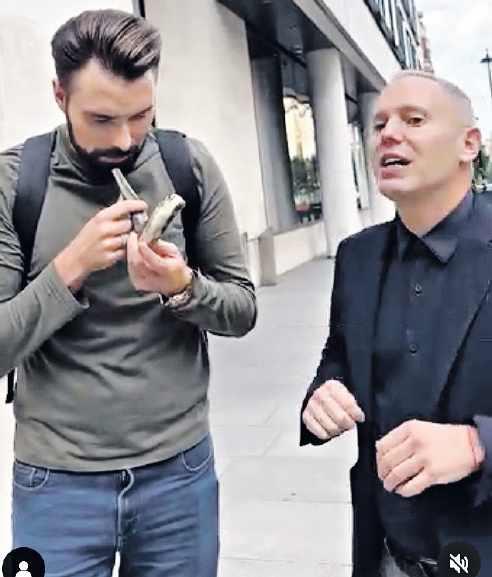
explorer’s – and that his DNA suggests he came from a Jewish family.
“We have DNA from Christopher Columbus, very partial, but sucient,” lead researcher José Antonio Lorente, at the University of Granada, said in the documentary.
“Both in the Y chromosome (male) and in the mitochondrial DNA (transmitted by the mother),
there are traits that are compatible with Jewish origin.”
Whether the findings are accurate may never be known. The forensic scientists have not yet released their raw data, and their report has not yet been peer-reviewed. A Spanish report says the research will appear in an international scientific journal in the near future.
Researchers who study Columbus say the purported findings are of only limited significance, even if true. DNA evidence would show only Jewish heritage, rather than identity, they say.
And Columbus’ own writings express both Christian beliefs and praise for the decree expelling Jews from Spain.
American troops will be stationed in Israel for the first time since 7 October 2023, as the country prepares for ongoing conflict with Iran, writes Sarah Miller.
The announcement came on the day a Hezbollah drone strike on a military base in Israel killed four soldiers and injured nearly 60.
The developments signal that the war that began more than a year ago with Hamas’ invasion of Israel may expand across the region. Since 7 October 2023, the US has moved aircraft carriers to the region, devoted billions of dollars to military aid for Israel and taken other steps to show its support, but has yet to station troops on the ground in Israel as it fights a multi-front conflict.
The group of 100 US troops will come to Israel to operate the Terminal High Altitude Area Defence, or THAAD, an advanced missile defence system that will be stationed in Israel to repel an Iranian attack.
“This action underscores the United States’ ironclad commitment to the defence of Israel, and to defend Americans in Israel, from any further ballistic missile attacks by Iran,” Maj Gen Pat Ryder, the Pentagon press secretary, said in a statement on Sunday. “It is part of the broader adjustments the US military has made in recent months, to support the defence of Israel and protect Americans from attacks by

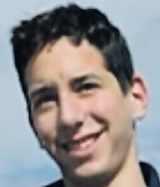
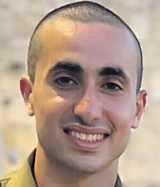
The drone strike that killed four soldiers on Sunday near the city of Binyamina hit a mess hall where troops were eating.
Israel is expected to strike Iran in the near future in response to a barrage of 180 ballistic missiles Iran fired at the country at the beginning of the month, the second time this year that Iran attacked Israel directly. After the first Iranian barrage, in April, Israel carried out a small-scale response strike, but may be preparing for a wider retaliation this time, as the US is signaling that it has a green light to respond.
While one person was killed by the Iranian barrage, it caused relatively little damage in Israel, but the THAAD system could help further protect Israeli population centres if Iran strikes again. The US sent
troops to Israel under similar circumstances in 1991, during the Gulf War, to operate missile defence systems protecting against Iraqi strikes.
Hezbollah began firing missiles at Israel shortly after the 7 October attack last year.
The conflict has escalated sharply in recent weeks, as Israel killed Hezbollah’s leader, Hassan Nasrallah, and several other senior commanders of the group, and depleted much of its missile capabilities. Israel has also sent troops into Lebanon to distance Hezbollah from the border and ensure that tens of thousands of Israeli citizens who have evacuated the border area can return home.
Iran’s strike on 1 October came in response to Nasrallah’s killing, and Hezbollah has ramped up its own strikes across Israel.
Continued from page 1 in the south by Hamas but then continually with rockets by Hezbollah in the north.
“We all want this conflict to end but it has to end in a way that is sustainable so that it does not restart. That is why it is right to back Israel’s right of self-defence. But it is not a blank cheque, it’s not unconditional. We do want to see aid get through to Gaza and we do want the role of the UN in Lebanon to be respected.”
Weeks after taking office, David Lammy announced the suspension of about 30 of the UK’s 350 arms export licences to Israel amid a “clear risk” they could be used to breach international humanitarian law.
Yesterday, the foreign secretary criticised the “inaction of the Israeli government” for allowing “impunity to flourish” among extremist settlers in the West Bank as the UK announced fresh sanctions in response to continued violence.
Sacked Bristol University professor David Miller stands to lose half his potential compensation as a result of statements he made following his removal in 2021, writes Jenni Frazer.
An employment tribunal ruled in February that Miller had been unfairly dismissed and that his anti-Zionist beliefs qualified as a protected characteristic under the 2010 Equality Act.
This week, the 120-page judgment of the tribunal was published.
The judge, Rohan Pirani, said: “Although many would vehemently and cogently disagree with Miller’s analysis of politics and history, others have the same or similar beliefs. We find that he has established that [the criteria] have
been met and that his belief amounted to a philosophical belief.” Miller, who lectured on political sociology, told the panel he thought Zionism was “inherently racist, imperialist and colonial”.
But he posted comments on social media in August 2023 saying that “Jews are not discriminated against”, they are “overrepresented” and that “Judeophobia barely exists these days”.
The tribunal found that, had Miller still been employed at the time he made these posts, there was a 30 percent chance that he would have been dismissed shortly after these further comments, a fact that affected the level of damages occasioned by the unfair dismissal and discrimination claims.
US presidential candidate Kamala Harris has vowed never to allow Iran to obtain a nuclear weapon, saying she would prefer diplomacy but considers

More than 2,000 people in Lebanon have been killed in the conflict — both fighters and civilians — while dozens of soldiers and civilians have been killed in Israel. Israeli fire has also injured United Nations peacekeeping troops, who Israel called on to evacuate on Sunday, saying Hamas fighters are embedded around them.

“all options are on the table”.
“Make no mistake, as president, I will never hesitate to take whatever action is necessary to defend American forces and interests from Iran and Iran-backed terrorists, and I will never allow Iran to acquire a nuclear weapon,” she said. “Diplomacy is my preferred path to that end, but all options are on the table.”
The phrase “all options are on the table” is a familiar one: It was used often by President Barack Obama when he was shaping the 2015 sanctions relief for nuclear rollback deal with Iran.
Using it now, a week after Iran barraged Israel with missiles and Israel is contemplating how to retaliate, amounts to an indication that Harris will provide what Israel has long sought from successive US administrations: a guarantee that it will back Israel in keeping Iran from going nuclear, including though military action.
Israel would need an influx of powerful weapons from the United States to carry out a successful attack on nuclear sites, which are burrowed beneath mountains, according to experts.
President Joe Biden has indicated he would back an Israeli strike in retaliation for Iran’s mass missile attack on Israel earlier this month.
But he has also said that hitting Iranian nuclear sites now is not an option, as it would likely escalate war in the region.
Trump has not said whether he would assist Israel in such a strike.
The Metropolitan Police has responded defensively to a video of two of its officers telling someone in central London that support for Hezbollah was not illegal, writes Jenni Frazer.
The video was taken last month at a rally in Trafalgar Square, billed as a Vigil for Lebanon, following the assassination of the Hezbollah leader, Hassan Nasrallah. Hezbollah is a terrorist organisation proscribed in the UK.
In the video, filmed for and distributed by the Campaign Against Antisemitism, a man has an encounter with two police officers. He tells them: “They were mourning the death of a leader of a terrorist organisation.” The officers reply that “Your opinion is your opinion.”
The man repeats his assertion that “legally it’s a terrorist organisation”. The officers say again that this is “an opinion” and continue to argue with him. They then ask him to move away from the area.
The CAA, which posted the video on Twitter/X, said: “If you have wondered why the Met’s policing of antisemitism and support for terror has been so poor, here is why.
“How is the Metropolitan Police supposed

to protect us when they don’t actually educate their officers on the law?”
In a response, the Met said it accepted that the CAA video showed that it needed to do more to make sure the details of its briefings on proscribed terrorist organisations were fully understood.
It added: “Contrary to what was said in the video, this particular event was advertised as a Vigil for Lebanon and not for Hassan Nasrallah, or Hezbollah, specifically. Attendance was limited and officers were in the area throughout in order to identify any offences, including support for proscribed organisations.”
The government this week announced a new round of sanctions targeting senior Iranian military figures and organisations for their role in attempting to destabilise the Middle East, writes Lee Harpin.
In response to Iran’s attack against Israel on 1 October, the package targets senior figures who facilitate this behaviour, in the Islamic Republic of Iran Army, Iran’s Air Force and the IRGC Intelligence Organisation.
The package will also designate Farzanegan Propulsion Systems Design Bureau (FPSDB), which designs and manufactures parts that can be used in cruise missiles, as well as the Iranian Space Agency, which develops technologies that
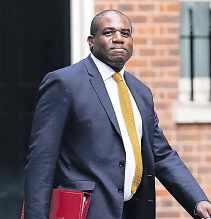
David Lammy: ‘exposing’ Iran
have applications in ballistic missile development.
Foreign Secretary David Lammy said: “Despite repeated warnings, the dangerous actions of Iran and its proxies are driving further escalation in the Middle East.
“Following its ballistic missile attack on Israel, we are holding Iran to account and exposing those who facilitated these acts.
“Alongside allies and partners, we will continue to take necessary measures to challenge Iran’s unacceptable threats and press for deescalation across the region.
“This announcement follows repeated warnings from the UK and international partners calling on Iran to cease its dangerous and escalatory activity across the Middle East.”
Among the Iranians sanctioned in the new package, which will subject them to a travel ban and asset freeze, are: Abdolrahim Mousavi, commander-in-chief of the Islamic Republic of Iran Army and a member of Iran’s Supreme National Security Council, and Mohammad-Hossein Dadras, deputy commander-in chief of the Islamic Republic of Iran Army.
Also sanctioned were Houssein Pourfarzaneh, chief engineer of FPSDB; Mohammad Kazemi,
Tory leadership contenders Kemi Badenoch and Robert Jenrick this week expressed concern about the continuation of pro-Palestine protests as they appeared at a Conservative Friends of Israel hustings, writes Lee Harpin.
Speaking separately at a well-attended event on Monday night, Jenrick labelled the regular demos not just “anti-Israel or antiJewish – but anti-British”.
Badenoch accused the police of furthering criticism that they appeared to “want
certain groups to be more protected than others”.
Both candidates were quizzed by host Lord Polak before the audience, made of party activists, many from the community, were o ered the chance to put their questions to the two former ministers.
In an admission that the Tories failed to tackle the issues around Palestine protests and their impact on some of the community, Badenoch said:”If we had dealt with them early before it snowballed we would not be seeing the mass

Islamic Revolutionary Guard Corps (IRGC) intelligence chief; Hamid Vahedi, commander of the Islamic Republic of Iran Air Force; Habibollah Sayyari, head of the joint sta of the Iranian Army and deputy chief for coordination of the Iranian Army; and Ali-Mohammad Naini, IRGC spokesperson.
Labour is continuing to explore a possible amendment to existing laws to allow the government to put targeted, proscription-style restrictions on the operations of state-linked organisations such as the IRGC, an arm of the Iranian state.
David Cameron, Lammy’s predecessor as foreign secretary, with-

protests we are now, we could have dealt with this all the way back in October last year.”
Jenrick, who responded to a question put to him by Marble Arch synagogue’s Rabbi Daniel Epstein about the impact of the protests on his congregation, added: “I urged the Met
Oxford Street.”
He added he saw the “immensely damaging e ect on the British Jewish community and on the city more generally” the demos have had.
The South Wales Jewish community has accused Plaid Cymru of “aligning itself with voices that refuse to condemn terrorism” after the party called for an Israel arms ban.
All four of its MPs also called for a sporting and economic boycott of Israel over the war in Gaza in a vote at the party’s conference on Saturday.
Ben Lake, MP for Ceredigion Preseli, who proposed the motion, said:
“We should o er no assistance to states that are in contravention of UN Security Council resolutions and ICJ rulings.
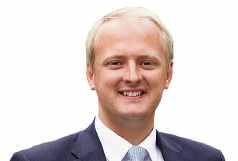
“We urgently need a political settlement to this war – that should include o cial recognition of Palestinian statehood.”
stood wide parliamentary pressure to proscribe the IRGC, arguing such a step could mean Tehran cutting o diplomatic relations with the UK. Unlike proscription of Hamas and Hezbollah, it would be a major jump for the UK to proscribe part of another state on the basis that it is involved in terrorist acts.
Amazon has taken down a video of one of its senior employees delivering a speech while wearing a necklace of the map of Israel with the Palestinian flag over it.
Dr Ruba Borno, a senior vice-president for Amazon Web Services (AWS), wore the pendant in a promotional film for the company’s re:Invent conference.
An Amazon spokesperson told Jewish News: “The video shot was not meant to be a political statement, but we’ve


taken down the video and will repost a new one in the coming days.”
Amazon employee Alexander Trupanov is among 101 hostages still held in Gaza.
the conference hosted Husam Zomlot, the Palestinians’ most senior envoy to the United Kingdom, who repeated calls for a ceasefire and said Israel must be “compelled” to meet its international obligations.
Israel was described as an
Israel was described as an “apartheid state” and was accused of “ethnic cleansing and war crimes”. The motion was supported unanimously.
Ahead of the motion,
Laurence Kahn, chair of the South Wales Jewish Representative Council, wrote: “Plaid Cymru’s stance not only fails to acknowledge Israel’s obligation to defend its citizens, but in its initial ‘condemnation’ of the attacks, it lent justification to heinous acts of terror.”
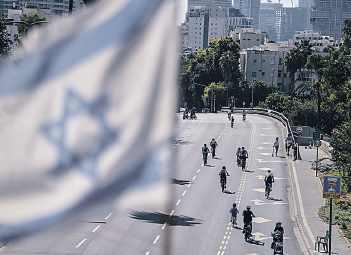
Lord Richard Hermer has said the UK government ‘would comply” with its legal obligations over any potential warrant from the International Criminal Court against Benjamin Netanyahu, writes Lee Harpin.
In his first interview since being appointed attorney general for England and Wales, Hermer said Britain’s new government was “determined not to do anything that undermines the work of the ICC”.
Speaking to the Financial Times, the barrister refused to discuss his role in the move by Labour to drop a proposed challenge to the ICC’s right to issue an arrest warrant against Netanyahu.
But he added: “As with any individual and any scenario relating to the
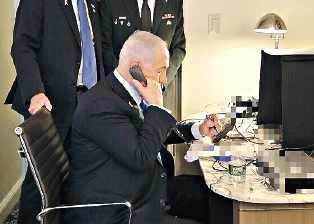
ICC we would comply with our lawful obligations.”
Weeks after the 7 October massacre by Hamas, Hermer was one of a group of Jewish lawyers to call on Israel to observe international laws in the wake of the terrorist attacks. He is also
believed to have been at the centre of the government’s controversial decision to announce a partial arms export embargo.
Stressing his staunch views around adherence to the rule of law, Hermer told the FT: “Over the last 14 years, perhaps over the past six years in particular, there has been a steady undermining . . . of core principles by the last government.
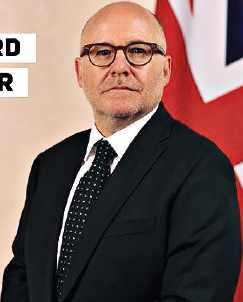

“A new government coming out to say we are good faith actors on the international stage, that when we sign a treaty we’re going to keep to it and not seek to wriggle out of it within five minutes, before the ink is dry, is so valuable for investment purposes.”

A rabbinic couple hired to support Jewish students at Yorkshire universities have been removed from their roles after historic social media posts including a call for “biblical punishment” for Palestinians were uncovered, writes Lee Harpin.
Rabbi Ariel Pariente and his wife Sonia recently moved from Jerusalem with their three children to become chaplains covering universities in York, Bradford, Hull, Huddersfield, Sheffield and Leeds.
The couple were appointed by the University Jewish Chaplaincy (UJC) to replace the previous chaplains who were forced on police advice to flee campus when they received death threats from pro-Palestine activists.
But this month social media posts from Mrs Pariente, dated before her appointment, included claims deaths in Gaza had been faked, used the slur word ‘Pallywood’ and a claim that “the life of an Israeli has a higher value than the life of a pali”.
She also appeared to claim in a post Palestinian children were not wanted by those seeking to adopt.
The posts were discovered by student pro-Palestinian campaigners,

who demanded the immediate removal of the couple from their roles at the University of Leeds. They were forwarded to UJC to investigate.
A university spokesperson said UJC had confirmed the matter had been dealt with and it no longer employed the chaplains for the Leeds and Yorkshire region.
The statement added: “We remain committed to providing support to all students and sta during this incredibly di cult time and condemn views or actions which deliberately seek to exclude or make Muslim, Jewish or any other people unwelcome on campus.”
UJC said it was now working on interim plans to ensure Jewish students across the region had some representation.
The chief executive of Masorti Judaism is stepping down early next year.
Rachel Sklan has been in post for nearly two years after being deputy chief executive of the conservative Jewish movement for three years and director of the movement’s youth arm, Noam.
Jewish News understands Sklan plans to stay on until January and the movement will advertise for a replacement imminently.
Masorti Judaism co-chairs Joe Carlebach and Miriam Farbey said: “Rachel’s time as CEO has included the most challenging year for Anglo-Jewish leaders in recent memory. In the complex aftermath of the tragic events
of 7 October, Rachel has created spaces for our communities to come together to mourn, to listen and to learn. Masorti has expanded under Rachel’s stewardship, now numbering 4,500 families in 14 communities.”
Sklan said it had been “a privilege” to work for Masorti and she would now be pursuing “my other passion in life, psychotherapy, and group work”.
She added: “Our Jewish values have never been more relevant and needed, our communities are thriving and stronger than ever [and] with an incredible team of professionals and lay leaders, I know the future will be bright in these di cult days.”





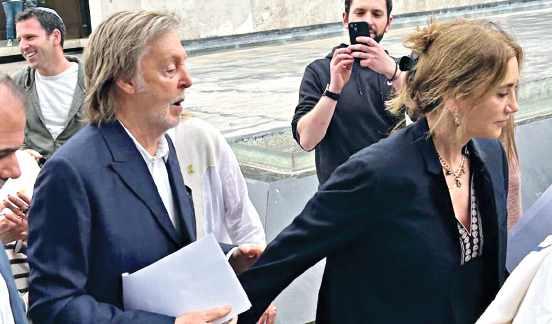



Events in this Trump-vs-Harris battleground will make all the difference in the election, writes Nathaniel Frum

For Democrats, the US election night maths is very simple. If Kamala Harris can win the state of Pennsylvania, and its 19 electoral votes, she will win the election. If not – probably not.
In the US, people don’t elect the president, states do. And among the groups that may play the largest role in swinging this ultimate swing state are Pennsylvania’s 300,000 Jews. Pennsylvania is only the fifth largest state. But the election in the four largest is mostly a foregone conclusion. California and New York will go Democratic blue; Texas and Florida, Republican red. Pennsylvania could go either way.
Donald Trump won here by fewer than 45,000 votes in 2016, the first Republican presidential candidate to do so since George H. W. Bush in 1988. In 2020, Joe Biden won by just over 80,000 votes. Polls have Trump and Harris in a dead heat in the state. A Democrat-commissioned poll had Harris up 72-25 percent among Jewish voters; independent polls have her support among Jewish voters lower than Biden’s in 2020.
Scranton Jewish Community Centre executive director Dan Cardonick says “both parties are working harder for the Jewish vote, there’s no question”.
While both sides accuse each other of antisemitic rhetoric, Cardonick points out Jewish voters in the key city feel “it’s a sad certainty that no matter who wins, antisemitism will still exist and we will still be faced
with the challenges of combating it.”
Cardonick says while he can’t discern who Jews in Lackawanna County will vote for, both campaigns are working harder than he has seen before to win the Jewish vote this November.
Historically, Pennsylvania Jewish voters have been solidly Democratic but Jews have suffered a notable rise in antisemitism and hate crimes, mostly stemming from bad actors from the far left.
Last month, two Jewish students at the University of Pittsburgh were attacked by a man wearing a keffiyeh while Temple University in Philadelphia saw a large pro-Palestinian march at the campus Hillel.
The University of Pennsylvania is facing a lawsuit for allegedly fostering an environment of antisemitism on campus and the US Anti Defamation League says antisemitic incidents skyrocketed after 7 October.
In Scranton, these incidents hit especially close to home. Last November, a Scranton man was killed in an incident with pro-Palestinian protesters in Los Angeles. That, says Jewish Federation of Northeast Pennsylvania president David Falk, made the nationwide rise in antisemitic rhetoric “get personal” to Jews in the Scranton area.
Such left-wing demonstrations at the colleges “may cut into the more liberal and moderate vote of the Jews”, says Falk. “Some of the more radical parts of the left move the needle more than radical parts of the right move it for the conservatives”.

Pennsylvania is led by a popular Jewish governor, Josh Shapiro. But further down the ballot, anti-Israel feeling is penetrating the state Democratic party.
In the state treasurer race, Democratic challenger Erin McClelland wants to divest from investment in Israeli bonds. In the Pittsburgh area, where the Tree of Life Synagogue was infamously attacked by a shooter in 2018, congresswoman Summer Lee, an outspoken critic of Israel, won her primary and seeks reelection. Jewish voters are concerned.
“Summer Lee has been incredibly problematic for the Jews in the district,” says spokesman Jeremy Kazzaz. “She has spread conspiracy theories based on Jewish control or Jewish insidious intent ... You have her spreading any rumour about things going on in Israel in a way to frequently feel a bit like blood libel.”
Kazzaz founded the Beacon Coalition after 7 October to bring awareness to candidates who are allies of the Jewish community and fight the normalisation of antisemitic candidates on both sides of the aisle in Pennsylvania.
Forensic accountant Harris Devor, a prominent voice in the Philadelphia Jewish community, says he has been disappointed by Vice President Harris’s stance on Israel: “You would expect someone who was a real friend of Israel to be much more vociferous about this.” He’s not alone.
Republicans are working hard to woo Pennsylvania’s Jewish voters.
Republican senatorial candidate Dave McCormick visited a synagogue to speak about the rising tide of antisemitism and on the same day held a fundraiser with Jewish leaders in Harrisburg. The efforts by the right might be working.
Gerald Morrison, who helped organise the fundraiser, sees an opportunity: “The strategy of the group of friends of mine, who are Republicans and find Harris repugnant, want Jews to understand how significant this vote is with respect to Israel. We specifically invited liberals, Jewish liberals.”
Morrison says he, and other Jewish voters in the area, are highly motivated by what they see as an enabling of antisemitic rhetoric on the left regarding Israel: “The Democrats have not stood up. They haven’t stood up for the Jews. They haven’t stood up for the Jewish kids on college campuses. It’s been awful. And we in the community know it.”
However, Trump’s Republican party has its own Jewish problem.
On 21 September, Trump’s running mate, senator J D Vance, attended an event in Hershey hosted by Tucker Carlson, who earlier aired a hugely publicised interview with Darryl Cooper, who produced a podcast and newsletter arguing the Holocaust was not intended by the Nazi regime. Vance has defended the interview.
Rabbi Marc Kline of Ohev Shalom congregation in Harrisburg worried the Vance event with Carlson could lead to more violent rhetoric from
the right. Kline said: “I’m genuinely concerned because this man has fostered violence”.
The shooter at the Tree of Life Synagogue, who killed 11 people, believed Jews were responsible for bringing in an immigrant caravan with the intention of destroying the “white race” – the same Great Replacement theory to which Carlson has given prominent voice. “We’ve felt it, since Pittsburgh, necessary to invest a lot in security” says David Fallk in Scranton.
Despite his accusations of rising antisemitism on the left, Trump has kept company with Holocaust deniers. In 2022, he hosted outspoken antisemites Nick Fuentes and Kanye West at Mar-a-Lago. Trump also endorsed the Republican candidate for governor in North Carolina, Mark Robinson, also an outspoken Holocaust denier and a recently self described “Black Nazi”. Trump’s recent rhetoric is doing him no favours among Jewish voters in Pennsylvania. On 19 September, at an event titled Fighting Antisemitism in America, Trump appeared to set the groundwork to blame Jewish voters should he lose this November. He said: “I’m not going to call this as a prediction, but in my opinion, the Jewish people would have a lot to do with a loss if I’m at 40 percent Jewish support in the polls.”
Later that day, he continued: “If I don’t win this election… the Jewish people would really have a lot to do with that.”











Three Jewish academics explored both British and American perspectives when they took part in a discussion at JW3 on the Hamas attacks and their aftermath, writes Beatrice Sayers.
While she could not offer comfort or catharsis, the hope was to bring clarity, said Dr Linda Maizels, a Chicago-based researcher on antisemitism.
At the anniversary event held on 7 October, Maizels borrowed from the Israeli historian Yehuda Bauer’s idea that describing the Holocaust as unique was not as helpful as describing it as unprecedented. The same went for the 7/10 massacre, she said, which was unprecedented in its intensity, “probably also in its gleeful celebration of Israeli death, in the dehumanisation of Israelis in general”.
She spoke of a pattern of treatment of Jews on American campuses, which she said had begun after 1967 and accelerated, especially during the second intifada. A binary had developed, of oppressors and oppressed, which came with the idea that Israel was a white, imperialist, European settler state. “Young Jews were being singled out as not only white but the epitome of whiteness.” And once they were identified as

oppressors, Jews had “no recourse to respond, because they’re part of the power structure”.
The difference now in the treatment of Jews on campuses in both the UK and the United States was that those ideas had moved from the extracurricular to the faculties themselves. “They’re in the classroom, and they are more difficult to combat,” she said.
Dr David Hirsh, a senior lecturer at Goldsmiths and director of the London Centre for the Study of Contemporary Antisemitism, spoke of 7 October as a “watershed”. A lot of British Jews had not experienced being frozen out in the way that some had in the Labour Party under Corbyn, and in the way he himself had been frozen out of sections of academia because he had made arguments against proposals to boycott Israeli academics.
“But then they did after 7 October,” Hirsh said. “A lot of Jewish people in Britain experienced themselves being made into a pariah and being accused of treason and of support for genocide, and that is the mechanism by which this kind of antisemitism operates.”
Anthony Julius, the lawyer and historian of antisemitism, told the audience that Jews were
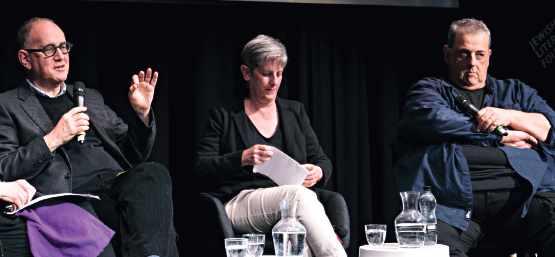
now in “a new reality”. That reality followed “the closed season on Jews”, as he described it, which lasted from 1945 and looped through events in Israel’s history until 1989. The collapse of communism meant that “a whole lot of disinherited people on the left looked for a cause”.
What the past year had shown Julius was that the debate about antisemitism and antiZionism was “mercifully” at an end. “We now know that the current iteration of antiZionism arrives at the same lethal outcome as the worst kinds of antisemitism,” he said. The past year had also fractured British and American Jews’ faith in their national institutions.
“For example, the BBC, universities, the Metropolitan Police. We no longer believe that we can rely on these institutions in our ordinary dealings with them.”
Julius felt that we no longer needed to debate with antisemites, because it had
become clear that Jew hate could not be “corrected” by argument and fact, a realisation he went so far as to describe as “liberating”.
The discussion, chaired by Rabbi Baroness Julia Neuberger, concluded with thoughts about what could be done to turn enemies of the Jews into their friends. Hirsh pointed to the importance of seeing antisemitism as part of a general rise of populism and conspiracy fantasy.
Neuberger herself was clear that dealing with antisemitism had to be done bluntly. We should tell antisemites “to hell with you”, and “eff off”, the rabbi told the audience. More positively, she recommended that Jews stand up and be proud, and that they recognise their friends. “Buy them a box of chocolates or a bunch of flowers,” she said. “That’s quite a good idea.”
Responses to 7 October, in three volumes, is published by Routledge
A survivor of the Nova music festival massacre has thanked the community for its “unbelievable support” during the past 12 months, writes Adam Decker.
Omer Yaacobi shared his testimony with more than 100 Jewish community members and allies during an event hosted by Emunah at Finchley Reform Synagogue.
The former IDF combat fighter recalled his excitement at attending the Nova festival with 12 of his closest friends.
“We arrived on 7 October at 4.30am and for the first few hours there was great music with people coming together to dance and feel free. Yet, by 6.30am, the party was over. We saw over 200 missiles fired from Gaza – just three miles away – in one hour.”
Yaacobi then recounted scenes of panic and chaos as thousands of attendees attempted to flee the area.
“We tried to drive away but the narrow roads were blocked up and we heard terrible noises of people being shot around us.
“Only then did we truly realise our borders had been breached and the Hamas terrorists had invaded with the sole purpose of murdering our people.”
The 25-year-old spent the next 12 hours hiding and moving slowly away from the scene of the massacre, encountering dozens of others all attempting to flee.
“I knew I had to focus to survive. That’s what they train you for in the IDF – for those moments when it all falls apart.”
Eventually, he made it five miles to the town of Patish, which had managed to keep terrorists at bay.
One thousand people from the festival sought safety in the town by nightfall on 7 October. “Luckily for me, all of my friends made it home safe, but many others did not,” Yaacobi said.
In total, 364 festival-goers were murdered and 44 taken by Hamas terrorists to Gaza as hostages. Some are still held.
Remarkably, by 7.30am the next day – after being awake for 36 hours straight – Yaacobi was called up to the reservists.
“I was very ready to go and serve my country. I’d spent a whole day feeling completely helpless where all I could do was run and hide.”
He spent the next 24 hours witnessing appalling scenes during a clean-up operation. He recalled finding an eight-year-old girl in
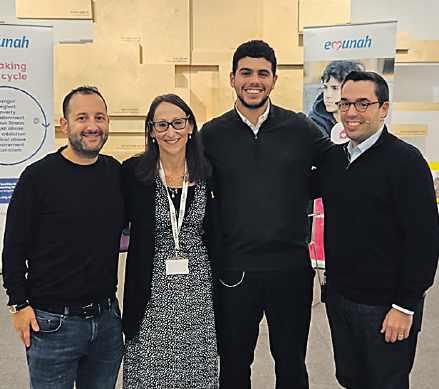
at point-blank range.
Yet, despite the harrowing experience, Yaacobi recalled an “amazing feeling” on his return to central Israel.
“I saw the strong Jewish spirit. People were hugging us and bringing food and drinks. I felt Israel was
united and we stood strong.” Yaacobi’s fortitude was put to the test throughout this period: at one point he went 64 hours without sleep.
Reflecting on the evening, Julia Kay, CEO of Emunah, told Jewish News: “It is incredibly important for people to hear a soldier’s perspective of what happened on October 7th.
You can witness scenes on television, but when you hear a testimony in person it has a whole di erent meaning.
“As the third-largest social provider in Israel, we [Emunah] continue to provide a huge amount of trauma and PTSD therapeutic services to families and soldiers right across Israel. They really need our support at this di cult time.”
Among the attendees was Mike Freer, former Conservative MP for Finchley and Golders Green. He told Jewish News of his determination to “show my continued support for Israel and keep hearing the testimonies of survivors.”
He added: “I worry that those in Israel don’t realise just how many friends they have in the diasporawe are the silent majority.
“As friends and allies of the Jewish community, we need to speak up and raise our voices.”
Concluding his testimony, Yaacobi focused on the mission at hand.
“As soon as I land back in Israel this week, I will be going straight back into Gaza.
“I do so proudly, clear in our goal of finishing the war and bringing the hostages back. That is the number one priority.”

































Modern assisted living retirement apartments


















It’s hard to leave a home filled with memories but is your current home really the best fit? Have your priorities or living needs changed? Is it still right for you?







Perhaps you’ve thought about downsizing, moving closer to family, or simply want a more manageable living space so you can focus on what truly matters.


Our thoughtfully designed homes bring together comfort, community, and peace of mind, with exceptional facilities, 24-hour concierge, and vibrant social opportunities right on your doorstep. Leave the burdens of homeownership behind and join the many who are finding a safer, more enjoyable future at Birchgrove.













A recent report found ‘overwhelming evidence’ that living in a community with others benefits people in later life. It helps them maintain health and independence and reduces the level of support needed as they age.
Research carried out by the King’s Fund and the University of York examined the value of retirement communities for the well-being of the people who live in them and for the health and social care system in the UK. The findings showed comprehensive and conclusive evidence that the retirement community model plays a vital role in supporting people in later life to live well for longer.
Retirement communities, often referred to as integrated retirement communities or assisted living, combine self-contained quality accommodation with tailored support services. This includes onsite dining and leisure facilities, such as a restaurant or café, wellness suite, resident lounges, and gardens; optional care and support packages; and a regular events programme to encourage social interaction and natural friendships to form.
The research found that meals and on-site support played a significant role in maintaining residents’ well-being. Furthermore, the evidence suggests that these helped lower depression, feelings of isolation, and anxiety and reduced the likelihood of falls and hospital admissions.
Loneliness is now one of the most serious public health concerns facing older people, with reported fall rates rising 36-42% higher than those with social contact. Retirement communities have tackled loneliness and isolation by creating opportunities for residents to participate in activities and events that interest them or develop and explore new skills in the company of liked-minded people.
Specialist retirement operator Birchgrove is rapidly growing its portfolio of high-quality retirement communities. One ingredient behind this success is the diverse breadth and depth of experience behind the Birchgrove name. All working together to create a community where people can age well by staying healthier, happier and stronger for longer.
Underlying Birchgrove’s business model is a belief that the current housing options for people over 65 exclude a large section of those who don’t want to manage another house purchase – and therefore “assisted living for rent is the missing piece in the housing puzzle; not right for all, but perfect for some.
There’s a Birchgrove community in London, Kent and Surrey. You will never find two Birchgrove developments the same because Birchgrove believes the place you call home should be as individual as the people and neighbourhood it sits within. Birchgrove ensures that every community is not only future-designed to suit people’s needs as they age but also has character to complement the local area. Thoughtful spaces that bring people together help forge communities where people feel grounded and at home.






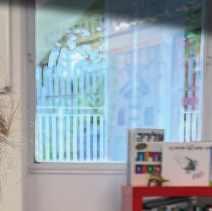








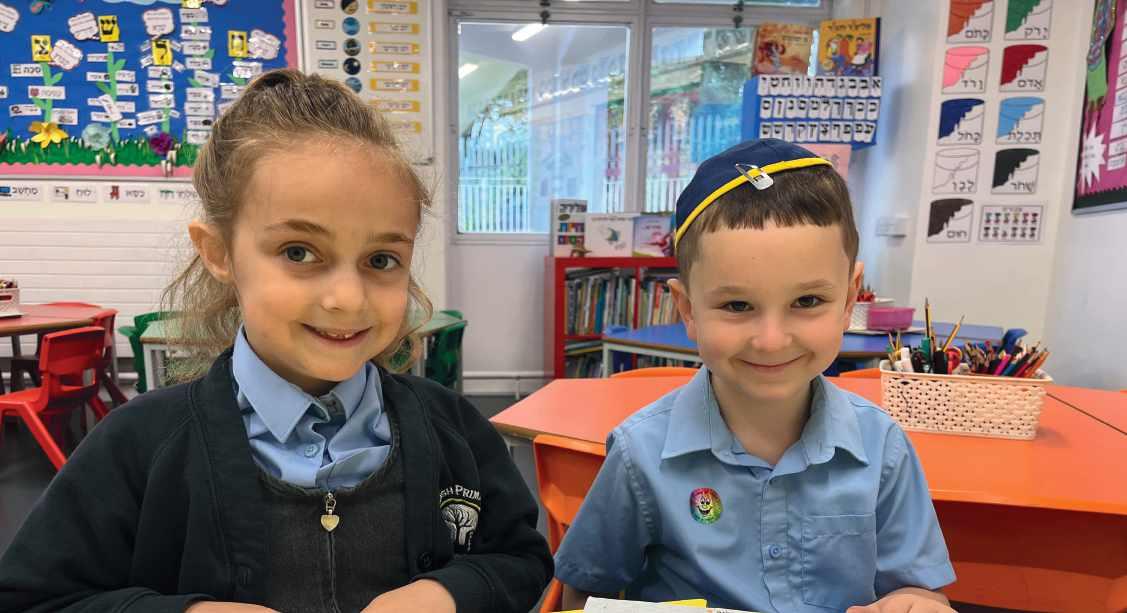








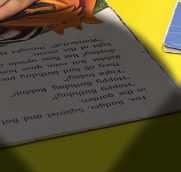

Open Events









Open EveningWednesday 12th November @ 7.30pm
Ope n M orn ingThursday 13th November @ 9.30am

Israeli and Palestinian voices had the opportunity to reflect together on the most testing of years during a moving and at times challenging 7 October anniversary event organised by Yachad and New Israel Fund UK, writes Lee Harpin.
One inevitable consequences of the Hamas atrocity and subsequent Israeli response in Gaza has been to push Israelis and Palestinians further apart than they have been for decades.
But the capacity audience at the event in Belsize Park showed how some in the community are seeking both to reflect on the horrors of the atrocity one year on and enter dialogue with Palestinians also reflecting on the horrendous loss of life in Gaza.
Yachad said the event was “an opportunity for us to come together in public, around a set of shared values, and belief and hope for a better future for all peoples of the region”.
Rabbi Anthony Lazarus from Mosaic Masorti said prayers, including kaddish, as the audience reflected on the suffering of the past 12 months, while members of the Habonim, LJY and RSY youth movements gathered around a memorial candle.
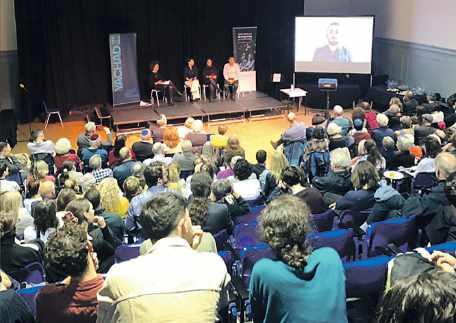
Speakers included Sharone Lifschitz, whose father, Oded, 83, has been a hostage since 7 October 2023 and whose 86-year-old mother Yocheved was released two weeks after being captured at Kibbutz Nir Oz.
Israeli peace activist Magen Inon, whose parents were murdered by Hamas terrorists, also spoke.
Lifschitz, from a family of
renowned peace activists, said there was now a desperate need to “find a system to stop the fanatics destroying efforts and good efforts of those who want to build bridges”.
Palestinian voices included the deputy mayor of Haifa, Shahira Shalabi, and Khalil Sayegh, a Palestinian Christian, born and raised in the Gaza Strip before moving to the US.
Speaking via video link, Sayegh clarified why he was participating, saying: “It’s not a popular thing for Palestinians during this time… with what is still ongoing in Gaza, that a Palestinian would come to such an event... even after my father was killed, even after my sister was killed in Gaza, and many of my friends as well.
“The answer is that I think ‘is that something my sister, my brother, my father would be proud of?’
“And my answer, the way I see it, is that me trying to participate in an event so I can try to prevent the child who died tomorrow or after tomorrow from dying… that’s why.”
Yachad director Hannah Weisfeld, who chaired the discussion, told the audience: “This has been an unbelievably difficult 12 months.
“[But] the thing I hold on to is that whenever we try to create a space like the one tonight, where there are Israeli voices, Palestinian voices, voices of Palestinian citizens of Israel, people flock to the room.
“We have an overflowing room tonight. It fills me with some hope that people really want to hear our perspectives and opinions.”

Goldsmiths University students were urged to join in chants of “From Gaza to Beirut, all our martyrs we salute” as anti-Israel activists staged their latest “walkout” at the south-east London institution, writes Lee Harpin.
Jewish News witnessed pro-Palestine activists from the Youth Demand and Goldsmiths for Palestine groups hand out printed sheets titled Chants For Palestine including the claim: “There is only one solution, intifada, revolution. We

will free Palestine within our lifetime from the belly of the beast.”
Other chants included the infamous “From the river to the sea” and calls of “From London to Gaza Globalise The Intifada” and “When people are occupied, resistance is justified”.
Jewish News understands students and staff are increasingly frustrated by the frequency of the protests and failure by the authorities to intervene.
Goldsmiths later claimed: “We have
published guidance on campus demonstrations which emphasise both the right to protest and the need for such protests to take place in line with our policies, our values and the law. Our prime concern is to ensure that our staff and students are safe and supported.
“The guidance spells out that protesters don’t use words or images that incite racism or hatred and that they don’t promote banned organisations or acts of terrorism.”

A swastika was daubed in a
Sand bunkers at Hendon Golf Club have been daubed with vile antisemitic slurs including “f*** the Jews”, “Heil Hitler” and a Nazi swastika symbol.
The symbols and words were discovered a week ago at the north London club, which has a significant Jewish membership and is minutes from a synagogue.
In a statement, the club confirmed it was “subject to a despicable act of racism” and an “act of antisemitism”.
It confirmed the “racerelated” vandalism had taken place at the normally picturesque course “in the early hours of Friday morning”.
Hendon MP David PintoDuschinsky said: “I am aware of the disgusting antisemitic message/graffiti that was left at Hendon Golf Club. It’s utterly appalling.
“I’ve reported it to the police and the CST and will be talking to the club. It’s completely unacceptable. I want the people who did this caught and punished.”
Word quickly spread locally about the incident in the hours leading up to the start of Yom Kippur.
One local wrote on social media that “Jew-hate was moving ever closer”.
The golf club was the venue for Chabad Mill Hill’s Rosh Hashanah service and dinner earlier this month.










“This is my tree of Chai, my tree of light. Through the art group, we find creativity, renewal, community and exceptional care.












We discover we are so much more than a cancer diagnosis.
That’s the miracle of Chai.”
The Chai Art Workshop Group (Artist, Elaine Arenson)





For more information on our extensive range of specialised services and care across the UK, please call our Freephone helpline on 0808 808 4567 or visit www.chaicancercare.org
by Michelle Rosenberg michelle@jewishnews.co.uk
Government officials, ambassadors, bereaved families and UK representatives have signed a Book of Reflection commemorating the first anniversary of the 7 October atrocities.
The Israeli Embassy in the UK hosted signatories paying tribute to the victims of the Hamas massacre.
They included former prime minister Boris Johnson and present deputy premier Angela Rayner (pictured), foreign secretary David Lammy, Conservative MP for North West Essex Kemi Badenoch and attorney general Lord Hermer KC.
Others signing: business secretary Jonathan Reynolds, Harrow East MP Bob Blackman, Tory MP for Havant Alan Mak, and Ferenc Kumin, the Hungarian ambassador.
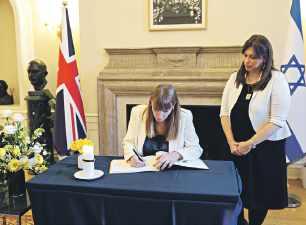
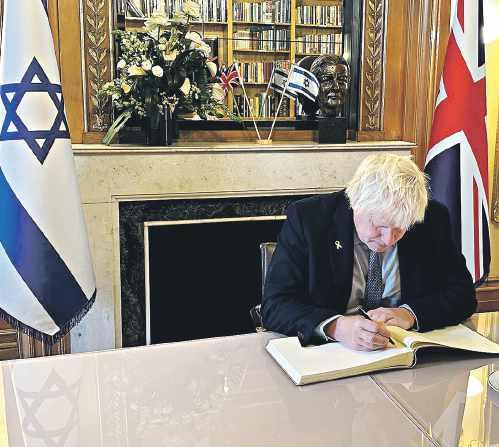
A charity has withdrawn a patronage from film director Asif Kapadia after a backlash over his sharing allegedlyantisemitic social media posts.
The Grierson Trust acted after Jewish News reported concerns by Jewish figures in the industry about the posts shared by Kapadia, best known for directing the documentary Amy, about Amy Winehouse, and Senna, a film about the Brazilian racing driver.
Among the posts was a cartoon of Benjamin Netanyahu dining at a blood-stained table in the rubble of Gaza, with the caption “kosher” at the top.
Other posts included an image of a scene from Schindler’s List in which Ralph Fiennes’ Amon Göth shoots at prisoners from a balcony.
The image was captioned: “Do you remember this scene from Schindler’s List? The same thing is happening in real time. They are Nazis.”
Kapadia was made a patron of the Grierson Trust with Louis Theroux and Dorothy
Byrne but the body then released a statement saying:
“Since the Grierson Trust announced Asif Kapadia had been appointed as one of our patrons, social media posts shared by him have been drawn to our attention which are antisemitic.
“As a result, we took the decision to rescind his role as patron of the Trust. When we made the decision to appoint Kapadia, the board was not aware of these posts, some of which appear to be no longer available, and we are sorry that our due diligence was not thorough enough.”
Leo Pearlman, managing partner at production company Fulwell 73, was among those to share screenshots of posts shared by Kapadia.
Another critic, Neil Grant, executive producer of 9/11: Inside the President’s War Room, said the decision by the trust to announce that Kapadia was one of three new patrons had caused “enormous offence”.
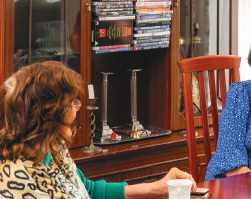


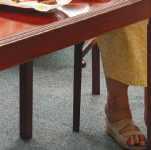

The Guardian has admitted “collective failure” led to the publication of a review of a Channel 4 documentary about 7 October that criticised the negative portrayal of Hamas terrorists, writes Michelle Rosenberg.
In a statement to Jewish News on Tuesday, the paper said: “A review of One Day in October, a documentary shown on Channel 4 about the Hamas massacre at the Be’eri kibbutz, was published on 10 October 2024 (G2, p10).
“The Guardian considers the article did convey the harrowing footage and powerful survivor interviews and condemned the attack’s perpetrators. But the unacceptable terms in which it went on to criticise the documentary were inconsistent with our editorial standards.


“This was a collective failure of process and we apologise for any offence caused. The article has been removed from our website.”
In his review of One Day in October, which uses CCTV footage to depict the massacre at Kibbutz Be’eri, Stuart Jeffries wrote: “[The documentary] does a good job of demonising Gazans, first as testosterone-crazed Hamas killers, later as shameless civilian looters, assetstripping the kibbutz while bodies lay in the street and the terrified living hid.”
Jeffries also complained in his piece that the programme does not help viewers understand “why” Hamas wanted to murder civilians.
Among critics of the programme, Dave Rich, director of policy at Community Security Trust
(CST), the charity that protects British Jews from antisemitism, wrote on Twitter/X: “As if there’s something wrong with sympathising with an Israeli child cowering in fear rather than the terrorists coming to kill.”
Simon Myerson KC wrote: “What’s fascinating about the review, given it went through the editorial process, is the light shed on groupthink Guardian, which lacks morality because all those involved regarded Jews as in some way deserving of death.”
David Baddiel posted: “The obvious thing to say is not that the documentary demonises Hamas – it simply shows Hamas, through their own footage – but that it makes uncomfortable viewing for those who wish to believe Hamas represents the Palestinians, both their suffering and their political purpose, rather than being inspired by Jew-hatred and violence.”





There were two eruptions of barbarism in October 2023. The first was Hamas’s pogrom of 7 October, in which more than a thousand people were slaughtered and many others maimed, raped and kidnapped.
The second was the sympathy for the pogrom across much of the Western world. The excuse-making for Hamas’s atrocities. The celebration, even, of this army of anti-Semites that had paraglided, barged and driven into southern Israel to deci-
territory and its people.
Leftists, influencers and members of the educated elites issued apologias for Hamas’s butchery of civilians. Some outright crowed about it. It was “exhilarating” and “energising”, said one American professor. “Glory to our martyrs”, said students at George Washington University in the US. A leading political theorist wrote about the thrill some felt upon seeing images of “paragliders evading Israeli air defences” and carrying out “seemingly
pogrom wasn’t enough, it seems.
Among the young in particular, affinity with Hamas and its ugly aims seemed chillingly commonplace. In December 2023, a Harvard/Harris poll found that 60 per cent of American 18-to-24-year-olds believed Hamas’s attack was justified by Palestinian grievances. An alarming 51 percent said they favoured a one-state solution in which the Jewish State would be brought to an end and the land handed to Hamas. There’s a phrase for that:
The second eruption of barbarism – the pogrom apologism that infected our own cities and institutions –surely confirms the moral disarray of a Western world that has turned its back on the principles of the Enlightenment and the virtues of civilisation. Ignoring this would be nothing short of suicidal.
It is imperative that we revisit the madness that seized Britain and other parts of the West in the weeks after Hamas’s pogrom.
Today is “a day of celebration”,
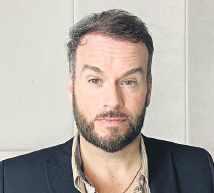
Author Brendan O’Neill





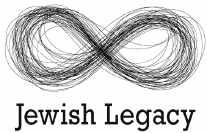

mate the civilian population there.
The bodies were barely cold, the hostages not yet shackled in Gaza’s dank tunnels, the rape victims still reeling from their vile defilement, when a cruel, taunting cry came from the West: “Well, what did you expect?”
On campuses, on social media and on the streets, there was an explosion of empathy – not with Israel but with the extremist brutes who had so horrifically violated its
impossible acts of bravery”. There was Hamas cosplay. Men in Hamas-style green bandanas were spotted on one of the antiIsrael marches in London. Three young women were photographed sporting paraglider stickers. In the weeks following Hamas’s orgy of murder, legions of England’s middle classes idly marched alongside radical Islamists who were chanting for ‘jihad’ against the Jewish State. One
ethnic cleansing. A UK poll found that 54 per cent of British 18-to-24-yearolds agreed with the statement, “The State of Israel should not exist”. Just 21 per cent disagreed.
It is now starting to make sense that members of the educated classes would march shoulder to shoulder with radical Islamists hollering for “jihad” in the aftermath of 7 October –both have adherents who long to purge the world of its only Jewish nation.
We need to talk about this. We need to talk about the pity for the pogromists that swept Britain and other nations in the wake of 7 October. We need to talk about the exhilaration of the activist class upon seeing kibbutzim invaded and Jews’ homes set on fire. We need to talk about the fact that when fascism reared its head once more, many of our young took its side.
The first eruption of barbarism in October 2023 – Hamas’s carnival of killing – confirmed what many of us already knew about Hamas: that it is a Jew-hating war machine that masquerades as a national-liberation movement.
said Rivkah Brown of British left-wing outlet Novara Media, on 7 October itself. Her colleague Michael Walker rhetorically asked: “Do we support the rights of an occupied people to fight an occupier or not?” Novara contributor and senior lecturer at Birkbeck University in London, Ashok Kumar, tweeted: “Sometimes partying on stolen land next to a concentration camp where a million people are starved has conse-


quences.” He was referring to Hamas’s assault on the Nova music festival, where it massacred 364 partying youths.
While the pogrom was in full flow, 31 student organisations at Harvard University issued a statement saying “the Israeli regime” is “entirely responsible for all unfolding violence”.
This was the politics of “She was asking for it”. As women were being
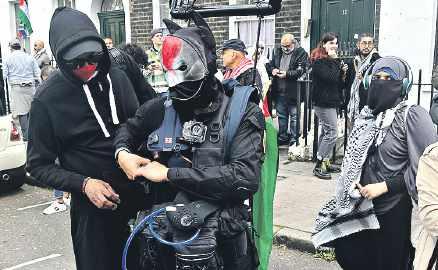





raped and ravers murdered, 5,000 miles away, on the leafy lawns of Harvard, the sons and daughters of privilege were essentially saying it was their own fault.
Universities were hotbeds of the Hamas sympathy that spread like a virus. At Birmingham University, protesters displayed a banner







this activism”, said Tanya Gold of this gathering of “Muslim fundamentalists and a uent socialists” a mere 48 hours after Hamas’s atrocity. It was as wicked and perverse as if Londoners had poured onto the streets to celebrate Kristallnacht. Then came the marches. Placards likened Zionism to Nazism. “From London to Gaza, we’ll have an inti-






saying “Zionists o our campus”. Some allegedly chanted “Death to Zionists”. A similar sentiment was expressed by one of the leading organisers of the pro-Palestine encampment at Columbia University in New York City. “Zionists don’t deserve to live”, he said.
It was a mere week after 7 October that Cornell University professor Russell Rickford said that, yes, “horrific acts” were carried out by Hamas, but 7 October was nonetheless “exhilarating”. A professor at Leicester University described 7 October as “heroic”. An Islamic scholar at the University of California, Irvine described it as a just attack on the “bloodthirsty animals” of Zionism. A lecturer at the City University of New York called for further resistance against these “Babylon swine”. On and on it went, academics awestruck by mass murder.
On our streets, too, Hamas apologism ran riot. On 9 October, before Israel’s military response had properly begun, protesters gathered at the Sydney Opera House to chant: “F**k the Jews!”
Also on 9 October, thousands gathered at the Israeli Embassy in London. One reporter said “the mood was celebratory, almost jubilant”: “Arabic pop music was blasting, people were linking arms and dancing, while fireworks went o overhead.”
This was a pro-pogrom celebration. In London. In 2023. “Celebration of Jewish death is implicit in
the KKK. Then came possibly the most unsettling element of the West’s post-pogrom madness: the frenzied tearing down of posters showing the Israelis who had been kidnapped.
Supporters of Israel put up “KIDNAPPED” posters in cities across Europe and the US. And almost everywhere they were attacked, ripped, gra tied, stomped.
Everywhere you looked in London you’d see remnants of the posters, scarred with the jagged claw marks of those who had tried to destroy them. These flapping shreds of paper, with just the eye or mouth of the kidnapped Jew still visible, were a testament to the anti-civilisational delirium that blew up in the West after Hamas’s pogrom.
One of the grimmest images of the postOctober moment was found in Finchley Road, where the faces of the three-year-old Israeli twins who were kidnapped on 7 October were daubed with Hitler moustaches. Toddlers reimagined as fascists. Jewish children treated as legitimate targets for bigoted invective. It was hard not to hear echoes of past catastrophes. As columnist Dan Hodges wrote of the tarnished twins: “This is what the Jewish community is facing. Not in 1936. In 2023. Here. In London.”
Anti-Semitism sky-rocketed. How could it not, given the feverish praise for a modern-day pogrom








fada!”, they chanted in Whitehall. The chilling cry “Globalise the intifada!” was heard everywhere.
At a London protest at the end of October, the slaughter of Israelis still fresh in Jewish Brits’ minds, a group of ke yeh-wearing Islamists chanted the Arabic war cry: “Khaybar, Khaybar, oh Jews, the army of Muhammad will return!” That’s a reference to the 7th-century Battle of Khaybar that took place in what is now Saudi Arabia, when Muhammad and his armies slaughtered Jews.
These protesters were taunting Jews with tales of their annihilation. Just weeks after a modern-day army of fanatics had annihilated yet more of them. At some point in the future, when their grandchildren ask what they did following the worst anti-Semitic attack in 80 years, some of London’s middle classes are going to have to say: “I marched with people who made fun of dead Jews.”
It soon became unsurprising to see brazen expressions of support for anti-Jewish militancy. In London, protesters chanted lovingly about the “pro-Palestine” Houthi rebels in Yemen and their campaign of terror against commercial ships in the Red Sea. “Yemen, Yemen, make us proud / Turn another ship around!”, they cried.
The flag of the Houthis contains the slogan “A Curse Upon the Jews”. And yet self-styled anti-racists were cheering on these anti-Semites. It was as mad as if the civil-rights movement had supported
spike in hate crime – it was a continuation of the pogrom. It was the globalisation of 7 October.
The pogrom sympathisers on university campuses and the flagrant anti-Semties on the streets – they were essentially amplifying the pogrom. They were doing Hamas’s bidding. They were the useful “progressive” idiots of one of the most regressive movements on Earth.
What was this fever? Why did self-styled antifascists cosy up to the fascists of Hamas? Why did feminists whose mantra is “Believe women’ refuse to believe that women were raped on 7 October? How did some of the highest seats of learning in Christendom come to be overrun by apologists for barbarism? Why did posters of children kidnapped by extremists evoke such fury that they were defaced with Nazi slander? What madness was this?
This is what we need to talk about. It seems to me that the post-October hysteria was the rotten fruit of the West’s turn against civilisation. Of our creeping abandonment of reason. Of our trading of the Enlightenment ideals of rational thought and democratic deliberation for the dead end of identity politics and competitive grievance.
Having schooled the new generation to be sceptical of the gains of civilisation, we cannot be surprised some of them seem tempted by









on campuses, on protests, on social media?
In the weeks after 7 October, anti-Semitic hate crimes in London rose by 1,350 per cent compared with the same period in 2022. In the US, antiSemitic attacks rose by 400 per cent. In Germany it was 240 per cent. In France, almost 100 per cent.




the lure of barbarism.
gogue in north London. A Berlin man set fire to a synagogue in synagogue in Melbourne was evacuated following the arrival
Jewish shops were attacked, and Jewish schools, and Jewish people. The word “Gaza” was scrawled at the entrance to the Wiener Historical Holocaust Library in central London, the world’s oldest such library. A teenage Jewish boy was pelted with stones on his way to synagogue in north London. A Berlin synagogue was firebombed. A man set fire to a synagogue in the French city of Rouen. A synagogue in Melbourne was evacuated following the arrival of “pro-Palestine” activists. Students at the Jewish Free School were permitted to remove their blazers while travelling to and from school, lest their school insignia reveal them as Jews to the hateful. Young British Jews reported hiding their kippahs under baseball caps. It was relentless.
And having conspired in the rise of an identitarian worldview that treats whites as oppressors and non-whites as victims, we should not be surprised that this is the only prism through which the young in particular can make sense of the 7 October pogrom and the subsequent war in Gaza. Israel white, Palestine brown. Thus, Israel bad, Palestine good.
The barbarous dearth of sympathy for the dead and kidnapped of Israel is the logical inhumane conclusion to a pseudo-progressive politics that judges people’s moral worth by their skin colour, their presumed privilege and their placement on a racial hierarchy fashioned by the unaccountable overlords of Western opinion. The 7 October pogrom raised to the surface of our societies, like scum on water, some of the most disturbing trends of our time. Clocking these trends, and confronting them, is the great, pressing task of the 21st century.
This was more than a


were permitted to remove their from school, lest their school insignia reveal them as Jews judges people’s moral worth by their skin and their placement on a racial countable overlords of Western opinion. The 7 October pogrom ties, like scum on water, some of the most disturbing trends of our time. Clocking these trends, and confronting them, is the great, pressing task of the 21st century.
• Brendan O’Neill’s After the Pogrom: 7 Civiliation, is published by Spiked Books and is available now
• Brendan O’Neill’s After the Pogrom: 7 October, Israel and the Crisis of Civiliation, is published by Spiked Books and is available now
Editorial comment and letters to the editor
The UK has many prestigious universities whose graduates have contributed and continue to contribute to our lives. In contrast, Israel’s premier university saves thousands of lives every day.
Technion – the Israel Institute of Technology – taught the developers of the Iron Dome, the halo of protection which intercepts and eliminates rockets currently being targeted at the country from all sides.
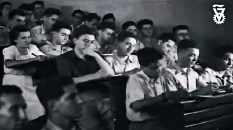
What, or if, Israel would be without the defence system inspired by a toy car mechanism is too dark for us to think about and explains the cries for its dismantling by envious denigrators.
That the brains behind the invention were nurtured at Technion is the reason why we are saluting the 100th anniversary of the first class taught there in 1924 (pictured).
From that lesson until now, the institute has been responsible for an extraordinary roster of scientific and technological advancements in medicine, defence and sustainability that is used across the world.
Since 7 October, too many recipients of Israel’s life-saving technology have forgotten where it was made, but the citizens never do and thank Technion alumnae in their prayers. Enjoy this week’s special four-page pull-out celebrating this remarkable university’s centenary.
MI5 director-general Ken McCallum’s recent warnings about rising terror threats linked to Iran and Islamist extremists should serve as a wake-up call. Far from being isolated, Israel’s struggle against terror groups like Hamas and Hezbollah is interconnected with global security, including the UK’s. In fact, Israel’s fight is a continuation of the West’s war on terror initiated after the 9/11 attacks in 2001, when Islamist extremism declared war on the world. The terror threats faced by Britain stem from the same ideology that drove the atrocities of 9/11
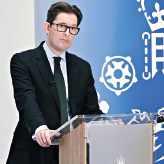
are more concerning than Neville Chamberlain’s infamous “peace in our time” moment before the Second World War. Starmer’s plea comes not before conflict, but after Israel has been brutally attacked on seven fronts, a moment reminiscent of 9/11, where terrorists launched coordinated assaults on innocent civilians. Calling for a ceasefire now does nothing but embolden the terror networks that threaten both Israel and the UK. Instead of signalling retreat, the prime minister should stand firm with Israel in its fight, knowing that every victory it achieves against terror is a victory for Britain as well.
Keir Starmer’s recent calls for a ceasefire
Eli Cohen, NW11
Your columnist Josh Glancy (3 October) is right that Isaiah Berlin, who saw as a child the horrors of the 1917 Revolution in Russia, found Britain a more welcoming and tolerant home than Lenin’s nightmare. Yet Mr Glancy is simply wrong in implying Mr Berlin would agree with his simplistic assessment of the UK in 2024 as being some wonderful home for the Jews.
Mr Berlin understood, as Mr Glancy and so many progressive Jewish thinkers do not, that the left always risks straying in to a wrongheaded idealism which seeks refuge in the simple binaries of ‘this good, that bad’. Mr Berlin was a
lifelong Zionist who, whenever he was called an English philosopher, stated simply that he was “...a Russian Jew from Riga, and all my years in England cannot change this”.
He understood the danger that the left in Europe, and England, could so easily categorise Jews in to the category of the bad. The great man was far too sophisticated a thinker to agree that just because the England of 2024 is not stringing Jews up in the street, somehow everything is OK.
Joseph Mintz
Associate Professor in Education University College London THIS WEEKEND'S YOM TOV TIMES...
Succot 1st Day
Wednesday night 5.51pm
Succot 2nd Day Thursday night 6.50pm

I don’t know which progressive Jews letter writer David Keys naively purports to represent, but it isn’t me or most of my fellow Reform Jews.
As much as Benjamin Netanyahu (right} is disliked by many here and in Israel, his aim to deal once and for all with the terrorists on the borders of Israel and beyond is no more than I’d expect of my own government.

Imagine French terrorists invading Dover, slaughtering 12,000 people – a number equivalent in population terms to the 1,200 or so in Israel on 7 October – and the government doing nothing. Imagine Scottish terrorists firing rockets on Carlisle and we do nothing. Imagine Irish terrorists rocketing Wales and we do nothing.
Barry Hyman, Bushey Heath
Thank you for helping to make Jewish News the leading source of news and opinion for the UK Jewish community. Unlike other Jewish media, we do not charge for content. That won’t change. Because we are charity-owned and free, we rely on advertising to cover our costs. This vital lifeline, which has dropped in recent years, has fallen further due to coronavirus.
Today we’re asking for your invaluable help to continue putting our community first in everything we do. For as little as £5 a month you can help sustain the vital work we do in celebrating and standing up for Jewish life in Britain.
Jewish News holds our community together and keeps us connected. Like a synagogue, it’s where people turn to feel part of something bigger. It also proudly shows the rest of Britain the vibrancy and rich culture of modern Jewish life.
You can make a quick and easy one-off or monthly contribution of £5, £10, £20 or any other sum you’re comfortable with. 100% of your donation will help us continue celebrating our community, in all its dynamic diversity. Support Jewish News by visiting our donor page at jewishnews.co.uk



























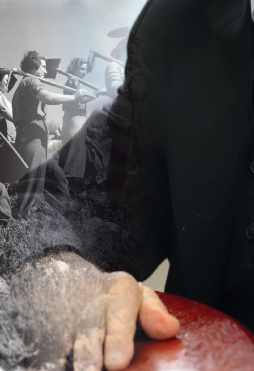









IT WOULD PERHAPS BE THE MORE HUMBLE APPROACH TO SAY THAT WHEN TECHNION opened its doors 100 years ago, no one could have envisaged just how successful it would be. In truth, however, the writing was always on the wall, ever since the idea for establishing an educational institute for engineers to support the development of the future state was first raised in 1901. By the time the Technion first opened its doors in 1924, therefore, the wheels were in motion to not only build the state of Israel but ensure it would both survive and thrive, brick by brick, start-up by start-up, invention by invention. Defence, aerospace, robotics, sustainability, computer science, healthcare and engineering — there isn’t a technological discipline the Technion doesn’t cover, and the country would simply not exist without its graduates. Here, we look at some of the biggest names to emerge from the Israel Institute of Technology and profile how they did just that.
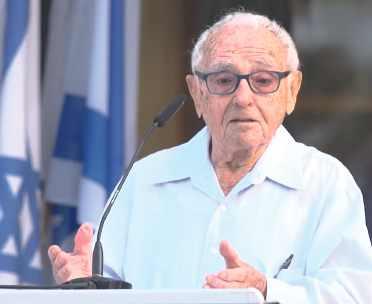





For Amos Horev, there is no self without the Technion. He does, after all, share his age with the institute, having celebrated his own centenary a few months ago.
Leaning on his own expertise as an Israeli military official, having jointly founded and served as a commander in the Palmach before the establishment of the state and later becoming a Major General and Chief Scientist of the IDF, he took a break to study mechanical engineering at the university before his studies were interrupted by the outbreak of the War of Independence. He later became the President of the Technion in 1973 and Chairman of Rafael Advanced Defense Systems - one of Israel’s three largest defence companies, home of the Iron Dome - in 1995. He was also involved in the Lavi aircraft project - a jet fighter that was developed in the 1980s.
Affectionately known as “Mr Technion,” he made significant contributions to the development of campus infrastructure and the improvement of
student welfare. In 2021, the new sports arena on campus was also inaugurated in his name. When it comes to celebrating someone who literally put his life on the line for the country time and time again, you won’t find someone more deserving, as his awarding of the Israel Defense Prize for lifetime achievement in 201º1 demonstrates.
We have all, unfortunately, become increasingly well-acquainted with the remarkable capabilities of the Iron Dome this year, but less so, perhaps, with the man behind it. Step forward Chanoch Levin: Team leader at Rafael Advanced Defense Systems made up of 350 Israel’s best engineers who, against all odds and defying the critics, created a system that would go on to save thousands and thousands of lives, destroying rockets between







2.5 to 45 miles in 15 seconds with a success rate of more than 90%.
Born in Tel Aviv in 1948 to Holocaust survivors, Chanoch graduated from the Technion in 1975 in mechanical engineering and started working at Rafael. Following the hit of four rockets on the northern Israel village where he and his family lived during the 2006 Second Lebanon War, he pitched an idea for a project that would intercept and destroy short-range rockets and was subsequently chosen to head the project.

Failure was not an option, despite widespread criticism and disbelief that this thing had legs, so he and his team would work 20-hour days over just four years. And here’s a fun fact that you might not know: The Iron Dome is the first and only missile in the world with an electrical component from a robotic toy found at Toys ‘R’ Us!
The US National Defense Industry Association awarded the Iron Dome a medal—the first time such an award was given to a defence project by a foreign country—while he was awarded the Israel Defense Prize and contributed some of the cash prize to the psychologists working with inhabitants of the Gaza envelope (the Israeli population bordering Gaza). However, the bigger reward must surely be the countless lives his invention continues to save on a daily basis.
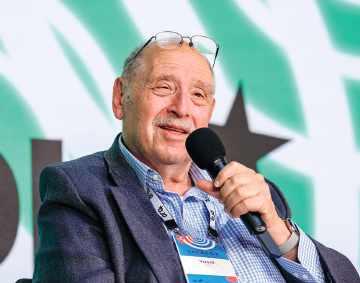
In the same way that you can’t think of hi-tech without thinking of Israel, you can’t think, either, of hi-tech without Yossi Vardi. Born in 1942, his doctorate in Operation Research from the Technion led to his becoming one of Israel’s first hi-tech entrepreneurs,
including ICQ instant messaging (now owned by AOL), which is one of the most successful internet products of all time with over 500 million downloads, thus making him one of the early pioneers of the internet industry. He has since founded and helped build over 85 hi-tech companies in various fields, including software, energy and water technology, and has served as a strategic advisor to Amazon, AOL and Siemens.
He also served in the Israeli government as the youngest ever appointed Director General of the Ministry of Development, at the age of 27, and as the Director General of the Ministry of Energy, leading the oil-related negotiations in the Israeli-Egyptian peace talks in 1979. After leaving the government, he led the peace, economic and regional cooperation negotiations with Jordan as special advisor to Israel’s Minister of Foreign Affairs and Minister of Finance.
The godfather of Israel’s booming hi-tech industry, he’s exited over 30 companies and has been involved in acquisitions with Microsoft, Yahoo, and eBay, to name but a few. He has also sat on the Boards of Directors for a number of Israel’s major companies, such as Bezek (Israel’s national telecommunications company) and Dead Sea Works. Additionally, he has been a member of the World Economic Forum and cochairman of the EU-Israel business dialogue.

and non-invasive disease diagnosis and has developed devices for screening, diagnosing and monitoring diseases via breath and tissue samples - most notably the NA-NOSE that can sniff out more than 17 diseases in a person’s breath, such as cancer, kidney disease, Parkinson’s and Alzheimer’s. The technology also aids in providing personalised diagnoses and tailoring personalised treatments.

This - and other technologies developed by him and his team - have led to the production of more than 52 patents and patent applications, many of which have been licensed to major international companies and leveraged into start-up companies. His studies have generated more than 300 publications in the last ten years in top-level journals, and his articles have received almost 30,000 citations, according to Google Scholar.
Unsurprisingly, he has received numerous awards, including the Prime Minister’s Israel Hi-tech Award for Life Achievement and Entrepreneur Of The Year.
Proving that the fabric of Israel is multicultural, mixed race and made up of multiple religions, Professor Hossam Haick is an Arab Israeli who earned his doctorate from the Technion in 2002 before becoming a full professor there in 2011. He is an expert and pioneer in the field of nanotechnology

Professor Haick has received more than 82 prizes and recognitions, such as the prestigious Marie Curie Excellence Award, whilst no scientific ranking lists of any note are complete without his name. He has currently been included in more than 42 such lists, such as MIT Magazine’s “The List of the World’s Top 35 Young Scientists” and The Jerusalem Post’s “Young Israelis of the Year”. He also enjoys continued success as a lecturer at the university, alongside his role as Dean of Undergraduate Studies. In 2014, he designed and developed the first massive open online course (MOOC) in the Technion, focusing on the fields of nanotechnology, and is the first

person worldwide to do so in two languages, English and Arabic. The course drew about 30,000 participants in its first year alone, disseminating knowledge about biomedical science and nanotechnology to people in both developed and developing countries without admissions bureaucracy.
In case this wasn’t enough, he also volunteers extensively throughout Israel, earning the Order of the Merit of Tikkun Olam. “Borders between Arabs and Jews cannot be felt in the Technion”, he has said. Only excellence matters.”

Ever since Professor Levenberg joined the Technion in 2004, she has become one of its biggest-known names. And for good reason. Once dean of the Faculty of Biomedical Engineering, she continues to make significant contributions in the field of stem cells and tissue engineering as head of the Stem Cell and Tissue Engineering Laboratory at the university. Some of her groundbreaking discoveries and developments include regenerative medicine via unique stem-cell engineered tissue constructs that induce the repair of injured spinal cords and genetically engineering

muscle tissue for treating type 2 diabetes, as well as sustainable food production that led her to establish Aleph Farms, which is revolutionising the food industry by producing real meat from cow cells without harming animals or the environment.
Professor Levenberg was named by Scientific American as a “Research Leader” in tissue engineering and has been the recipient of numerous awards and accolades, such as the Teva Research Prize and the Rappaport Prize for Biomedical Sciences. She has authored over 100 publications and presented her work in over 100 international conferences. She is a former member of the Israel National Council for Bioethics and is actively involved in training young scientists.
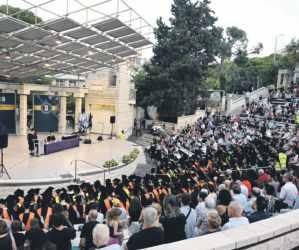
Renowned for her cuttingedge cancer, drug delivery research, tissue regeneration and cultivated meat, the work of Professor Marcelle Machluf has been included in the Israel Ministry of Science and Technology’s list of “Israel 60 Most Impactful Developments” for her work in the field of advanced cancer therapies. Indeed, Lady Globes Magazine’s 2018 “Woman of the Year’” is behind NanoGhost




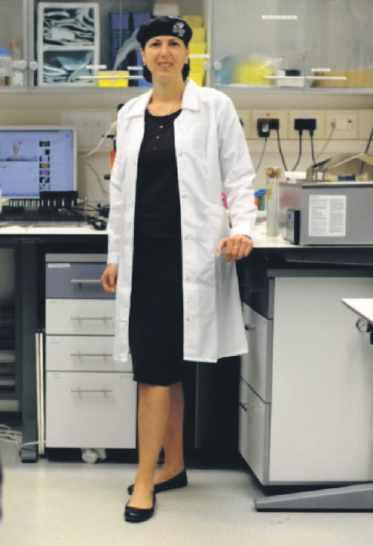
- a targeted drug delivery system using modified stem cells to hone in on tumours. She has also worked on developing scaffolding for tissue engineering of the pancreas, heart and blood vessels, as well as developing carriers for cell delivery with applications for treating diabetes, among other diseases.
Since joining the Technion in 2001, she has continued to add to her achievements. She is a member of the Technion Faculty of Biotechnology and the Affiliate Engineering Faculty of the Technion Integrated Cancer Center and has authored more than 90 peer-reviewed papers in leading journals, various chapters in books and over 200 conference papers, with citations totalling more than 2,800. She has a growing number of national and international patents in drug delivery and tissue engineering, whilst she has also received several honours.
Along with its evident roots in the establishment of the State of Israel, it’s clear that the country as we know it simplywould not exist without the Technion. Yet it’s vital to remember that the Technion is probably poised to be the biggestsingle contributor to Israel’s future, too. Once we get through our current challenges - and, indeed, these, too, are ever-reliant on the constant innovations coming out of the institute - there is no doubt that we need the Technion, more than ever, to help us move forward.
Please help Technion UK to support the future of Israel

Without your vital support most of the work of the Technion would not be possible. A gift in your Will will ensure that ground-breaking discoveries can continue. You can make a big difference, be a part of the future of Israel and have an everlasting memory for generations to come.
Technion’s science and technology is opening new frontiers to the benefit of Israel and mankind. From research into Cancer, Parkinsons and Alzheimer’s to its graduates developing nearly every single one of Israel’s defence systems including Iron Dome, the Technion and its graduates have helped to build Israel over the last 100 years.
INVEST IN THE TECHNION AND STRENGTHEN ISRAEL.
PLEASE GIVE YOUR LEGACY AND MAKE A LASTING DIFFERENCE
The Technion is the oldest university in Israel and is now celebrating its 100th Anniversary. It is a special place where dreams come true. It is home to thousands of the finest minds and talents from all over the world. These students, researchers, professors and educators come to Technion with an insatiable thirst for knowledge and the belief that science, progress and education will bring peace, harmony and welfare to mankind.
If you are writing or changing your will, we can arrange a suitable legal advisor for you.
CONTACT THE CEO ALAN AZIZ IN STRICT CONFIDENCE
ceo@technionuk.org 020 7495 6824
62 Grosvenor Street London W1K 3JF


In February this year, the Conservative government published guidance for schools on prohibiting the use of mobile phones throughout the school day, o ering recommendations on how each school, depending on “individual contexts and needs”, should implement a ban on “smartphones and other devices”.
Jonathan Haidt, the renowned American social psychologist and best-selling author, has written extensively about the dangers of smartphones and social media over decades.
What was once a helpful tool, he explains, “a Swiss army knife in our pockets” that combines phone, camera, map, and music player, has become a “tool of mass distraction,” rewiring our brains almost ominously.
The dangers are numerous: from overstimulation and distraction to encouraging negative body image and providing extensive, harmful exposure to inappropriate material.
Speaking to Finance360, Resicare Alliance head of clinical services and clinical lead
Antony Bainbridge highlighted that “children are adept at accessing social media without restrictions, raising serious concerns about cyberbullying, which is linked to anxiety and depression among young people”.
Resicare Alliance, which specialises in residential care for children and adults with learning disabilities, autism, mental health challenges and social, emotional, and behavioural needs, sees first-hand the dangers of unrestricted smartphone use.
In Belgium, mobile phones are banned in schools to protect children’s mental health, and Denmark has introduced strict rules requiring phones to be locked away during the school day, ensuring focus and calm in the classroom. Schools in Denmark report significant improvements in behaviour and concentration as a result.
This is exactly what many parents, school leaders, and educational organisations in the UK have been advocating for. The Labour government is now listening, with educa-
tion secretary Bridget Phillipson backing stricter controls on smartphone use in schools, stating that “too many children are distracted in class, and teachers spend too much time policing phone use”. This has led to an increasing number of schools pledging to become smartphone-free.
The Torah Education Committee (TEC), which represents schools within strictly Orthodox Jewish communities across the UK, has long recognised the harm smartphones can cause.
Thousands of children from ages three to 16 in TEC-represented schools do not have smartphones. Instead, they play outside, meet with family and friends, study together and enjoy family dinners of an evening.
Their daily lives follow a more traditional structure and routine, free from the constant, alluring yet harmful distraction of screens.
Pupils take pride in their learning, engaging deeply with Jewish texts and honing legal reasoning skills that many university law students would find challenging. They read books, enjoy comics and participate actively
in their communities, rather than scrolling mindlessly through a social media feed while lounging on a sofa for hours.
Schools under TEC encourage a life of productivity and community, keeping smartphones away from pupils at least until the age of 16. Naturally, every child should be taught about the world and its risks in a manner appropriate to his or her age and context. However, TEC schools, which prioritise safeguarding by prohibiting smartphone use, do not need to be lectured that their approach compromises safety, when, in fact, it strengthens it. Since February, it has become clear modern Britain is, in fact, recognising the benefits of these policies and ethos.
Experts now accept that the spiritual, moral, social and cultural development of Britain’s next generation may very well benefit from less screen time, not more.
TEC schools just hope that Ofsted’s inspectors will share the experts’ opinions.
• TEC and Resicare Alliance are clients of Roath PR Consultants
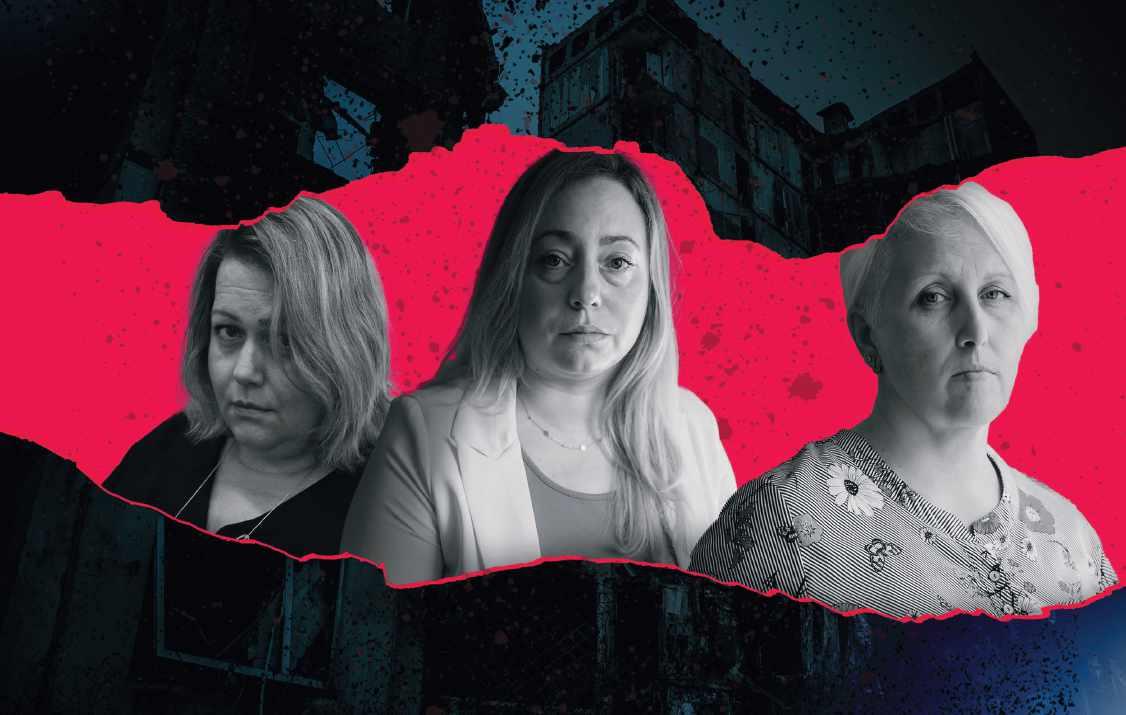

Aglib response is often trotted out when friends and contacts ask what we have planned postparliament; it goes: ‘There’s nothing more ex than an ex-MP.
Sadly, whether voluntarily exiting the role or being ejected by the electorate, the saying has a sad ring of truth about it. Inevitably the phone doesn’t ring so often, “friends’ are increasingly hard to pin down for those co ee meets or the beers after work. That’s life.
Sadly, it also means that communal organisations, so important to the Jewish community, are depleting their pool of friends and supporters. Given the current situation, when the community feels under siege, with rising levels of antisemitism, the need for friends and allies is as great as it’s ever been. Yet the ‘alumni’ are being allowed to drift away.
When was the last time you raged at a




company you’ve dealt with? Think of car insurance companies who, for years at renewal time, seem more interested in the new customer than in looking after those who have been loyal for years. It’s an age-old mistake to focus on the new ‘customers’ and forget the old customers in whom organisations have invested over many years. The costs of acquiring a new supporter/customer can be considerably more that retaining the established ones in the network.
Perhaps some organisations think that former MPs are no longer of use. I suspect most will simply not have given it a thought. It’s an unforced error rather than malice.
I understand entirely that the community needs to establish strong links with new members of parliament, whatever their political allegiance. Perfectly sensible and natural. But take a look at the fundraising dinners or the awareness events, same faces, same donors and sadly an ageing cohort.
So of course it’s necessary to attract ‘new blood’. But why discard those whom the community have spent years nurturing?
Supporters shouldn’t be allowed to drift away through neglect. Perhaps some organisations think former MPs are no longer of use, I suspect most will simply not have given it a thought, it’s an unforced error rather than malice.
Parliament is important for ensuring policies and laws reflect the needs of the community, of making sure the voices of the community are heard. Yet advocates on the ground, embedded in the wider community can have an important role to play.
Since leaving parliament, I’ve spoken to community leaders and at synagogues about how to get the wider British public to see the community I’ve got to know and admire.
I remain convinced that the wider British public are not antisemitic but that simply has no knowledge of the Jewish community.
I often joked that 60 percent of the UK’s Jewish population were within a 10-minute drive of my house in Finchley. I’ve also argued that the community needs to develop a wideranging outreach programme (I nicknamed it ‘Shabbat on Tour’) to show the public what the Jewish community is all about.
Let them see the warmth, the resilience, the commitment to education, family, charity and, yes, let them see a community vilified and targeted. Part of the outreach could be the network of ‘alumni’ who are being neglected.
I have no doubt that the network of former MPs would welcome organisations reaching out. Organisations should establish those alumni networks while the cohort is still ‘warm’. Leave it too long and the relationship will have cooled, perhaps to a point where it is hard to revive.
The community has many, many friends. Don’t let them go to waste!



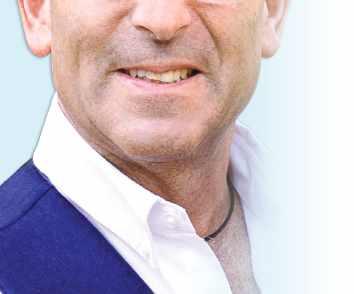


on 1 October. “The support and solidarity from leaders and nations around the world will never be forgotten. We know who our friends are.”
It speaks to the changing political climate that, back in March, Israel’s president Isaac Herzog was pictured smiling and shaking hands with the Dutch far-right leader Geert Wilders. A decade ago, such a photograph would have been unthinkable. Wilders, whose Party for Freedom won last year’s general election in the Netherlands and is now part of the government there, has, after all, long held extreme views on Islam, immigration and Europe: he has called for the ‘de-Islamisation’ of his country through a ban on Islamic schools, Qurans and mosques. He is, however, also a staunch supporter of Israel, tweeting of his meeting with its head of state: “I told him I am proud that he visits the Netherlands and that Israel has, and always will have, my full support in its fight against terror.” Herzog is not the only Israeli politician to lend Wilders his imprimatur. “Thank you, [ Wilders],” foreign minister Israel Katz tweeted


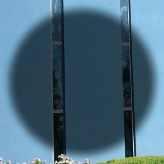
And Wilders is not the only far-right populist in Europe to gain the support of a leading Israeli politician. In July, diaspora affairs minister Amichai Chikli broke diplomatic convention and intervened in French legislative elections by endorsing Marine Le Pen.
Le Pen is a classic example of a far-right leader who has sought to belie her party’s antisemitic roots: her father, Jean-Marie, was convicted multiple times for denying or minimising the Holocaust. She has adopted a pro-Israel posture at a time when anti-Jewish hatred is on the rise and Jews across Europe feel pushed out from certain left-wing spaces in which they had traditionally found allies.
Le Pen also won the support of the activist, Nazi hunter and Holocaust survivor Serge Klarsfeld, who in June said he would vote for her National Rally. Philosopher Alain Finkielkraut too said that, if faced with a choice between the far-right and far-left, he would have “no other choice” but to plump for Le Pen.

The European far-right’s turn towards Israel, decades in the making but accelerated by the events of 7 October, is born out of a mixture of opportunism, romanticism and political reality. It benefits from its appearance of being pro-Israel, which has become a means of avoiding the charge of being antisemitic, even though, as in the case of Hungary’s Viktor Orbán’s case, his government is waging a propaganda war against the Jewish Hungarian-born philanthropist George Soros.
The European far-right, though, is also taken by the image of Israel as a ‘villa in the jungle’: an outpost of, through their eyes, Judeo-Christian civilisation in a thicket of Muslim enemies. Israel as the ‘muscular Jew,’ moreover, serves as a counterpoint to Jews such as Soros, for whom the far-right reserves especial opprobrium, a fixture in their conspiratorial thinking.
This (from a far-right perspective) idealistic image overlooks, of course, the complex realities of modern Israel, some of which Europe’s far-right would abhor. It is also true, though, that that reality includes a government to which the Israeli far-right is now party and
figures on the European far-right feel, therefore, a natural affinity.
Both Israel and Jews in Europe, however, should think carefully about who their true friends are in this time of crisis. Support for Israel does not automatically mean Europe’s far-right has distanced itself either from antisemitism or murderous history.
Consider that two days after Austria’s Freedom Party won legislative elections last month, several prominent members of the far-right party attended a funeral in Vienna at which Wenn alle untreu warden, once a song of allegiance to the SS, was sung.
That Europe’s Muslims have become the main enemy of the far-right does not mean, either, that Jewish communities are immune. A ban on religious circumcision or slaughter of animals, in an effort to outlaw Islamic practices, will mean a ban on brit milah and shechita too.
To Herzog, Europe’s far-right may appear to serve a purpose for Israel for now. But any alliance with the continent’s worst actors will only prove in the end to be destructive both for Israel and for Europe’s Jewish communities.



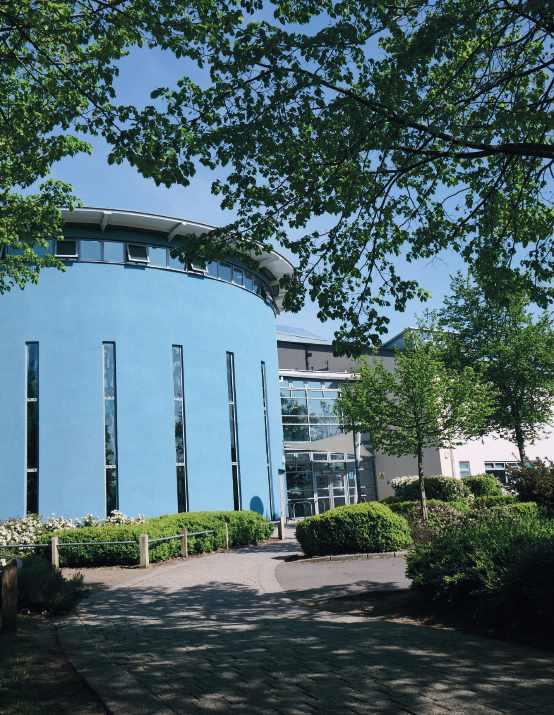














KAREN POLLOCK CHIEF EXECUTIVE, HOLOCAUST EDUCATIONAL TRUST
Heroine. Trailblazer. TikTok sensation. These words do not conjure up the image of a 100-year-old Jewish mother, grandmother, great-grandmother and great-great-grandmother. Yet that’s exactly who Lily Ebert was.
She was 20 years old when the Nazis ripped her and her family from their home and deported them to Auschwitz-Birkenau. On arrival she was separated from her mother Nina, her younger sister Berta and her younger brother Bela. They were sent to the gas chambers with more than 100 relatives.
Lily and her remaining sisters Renee and Piri were forced to work. When Renee was selected for the gas chambers, Lily risked her own life to save her by pulling her from the line. As the eldest sibling, she kept her sisters going.
Throughout her time in the camps, Lily was miraculously able to keep with her a pendant
that once belonged to her mother – hidden in the heel of her shoe and then, once that had worn out, in her daily ration of bread. Believed to be the only piece of gold that went through Auschwitz and came out with the original owner, it became a link between the family she lost and the family she rebuilt and a symbol of defiance against the Nazis who attempted to destroy any trace of European Jewry.
On Yom Kippur 1944, in Auschwitz, Lily made a promise that when she survived, she would tell the world what happened.
Always wanting to do more, she spoke across the country in schools, universities and workplaces. She met prime ministers, royalty and celebrities. She never did so without rolling up her sleeve to show them the number on her arm – 10572 – or bringing out her treasured photo album to show pictures of her life before the war and the family she had lost.
Nor did she stop there. Tenacity runs in the family, and Lily’s great-grandson, Dov, knew there were ways to reach even more people and share her story more widely. They joined TikTok in 2020, sharing Lily’s testimony and building a following of two million and more

than a billion views. What started in Covid in response to not being able to share testimony became a gateway to speaking to the world.
Lily became a trailblazer. Together, she and Dov wrote and published Lily’s Promise, a Sunday Times bestseller that has been translated and read across the world and which includes a foreword from King Charles.
Despite her experiences, Lily was the most joyful, energetic, loving woman anyone could hope to meet. She always had a sparkle in her eye, never took no for an answer and forever
maintained an element of rebellion. She loved speaking to and meeting new people – and regularly had to be dragged away from events! She was not only the matriarch of a large and loving family but a pillar of the community, an honorary grandmother to all. It is hard to find somebody who has not met or heard of Lily.
The outpouring of love and tributes on her passing included comments from the King, prime minister, leader of the Opposition, the Chief Rabbi, celebrities and influencers. There have been countless news articles and Lily was trending on X. It is a testament to the important place she holds in our community and the hearts of people all around the world.
Lily used to tell us regularly it was hope that sustained her during the Holocaust, that there is no survival without hope. Today, despite her passing, I have hope. Hope she will be remembered – not just for her experiences in the Holocaust, but as a spirited, courageous, unstoppable woman.
And thanks to her dedication to sharing her testimony and the foresight of her greatgrandson Dov, I have hope in the knowledge that Lily’s legacy will live on.














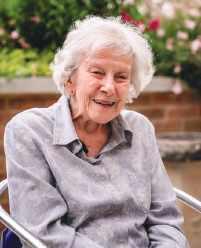








performed by RABBI LIONEL ROSENFELD and CHAZAN JONNY TURGEL accompanied by STEPHEN LEVEY
On October 7th, 2023, the unimaginable struck Israel. Over 1,200 innocent lives were brutally taken, and 235 people were kidnapped by terrorists. Many remain unaccounted for. In the face of such tragedy, Yad Sarah, Israel’s leading social welfare organization, has tirelessly cared for the elderly, disabled, and displaced citizens in Israel throughout the ongoing crisis.
This December, we invite you to a special evening of reflection, solidarity, and hope. Following their unforgettable performance last year, Rabbi Chazzan Lionel Rosenfeld, Chazzan Jonny Turgel, and maestro Stephen Levey will once again grace us with their powerful music.


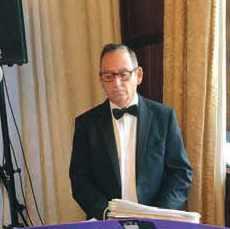
Date: 2nd December 2024
Venue: One Ashbourne Restaurant, Temple Fortune Tickets: £95 (includes dinner with wine and whiskey)
IF YOU WOULD LIKE TO ATTEND OR MAKE A DONATION
please follow the link - https://yadsarah.org.uk/donations/charity-event/ or get in contact with Michael Marks 020 3397 3363, michael@yadsarah.org.uk
Reg. Charity No. 294801

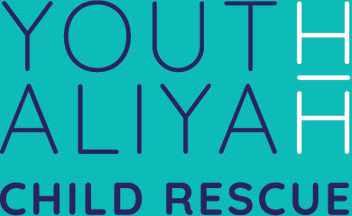


Daniel, our Neve Hadassah Youth Village graduate, was severely injured in Gaza.
After 5 months in hospital, with Neve Hadassah staff by his side, the first place Daniel went to visit was his home at the Youth Village, where he had lived before joining the IDF’s Kfir Infantry Brigade.
The children we support need the anchor of “home” now more than ever. The graduate programmes at each Youth Village are funded by donations like yours.
Please donate to help us make sure that our children always have a safe home to return to.
Am Yisrael Chai
wanted to feel safe... ...I wanted to go home” or scan to donate


“I just

Todd Solondz’s controversial black comedy gets a new lease of life.
By Darren Richman
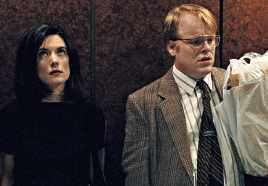
The consensus seems to be that you could never make a film like Happiness now but, in truth, you couldn’t really make it back then.
Before 1998, Todd Solondz had made just two films. His debut, 1989’s Fear, Anxiety and Depression, had a title that neatly summed up the director’s state of mind but was a critical and commercial failure with its pale imitation of Woody Allen. Solondz was infuriated by a lack of creative control and did not make another film until Welcome to the Dollhouse in 1995. In a shock to everyone, not least the filmmaker, that sophomoric e ort was a hit. A low budget, independent black comedy about the hell of high school populated almost exclusively with characters it’s impossible to like, Solondz’s second movie nevertheless won the Grand Jury Prize at Sundance and made $5m at the box o ce.
Perhaps sensing his career would not prove to be an unmitigated success, the writer-director decided to strike while the iron was hot and make a film so provocative the funding could only possibly come at the peak of his popularity. Sundance, the scene of Solondz’s greatest triumph, refused to screen Happiness. The film’s original distributor got cold feet and would not release the film after the CEO deemed the material “morally objectionable” and personally intervened. It’s safe to say one wouldn’t want all films to be made by Solondz but it’s good to have a few that are. Happiness opens with a close-up of Jane Adams’ face as she asks her date if he is OK. We then cut to a close-up on the sweaty visage of Jon Lovitz, a comedy legend very clearly holding back tears. As the exchange
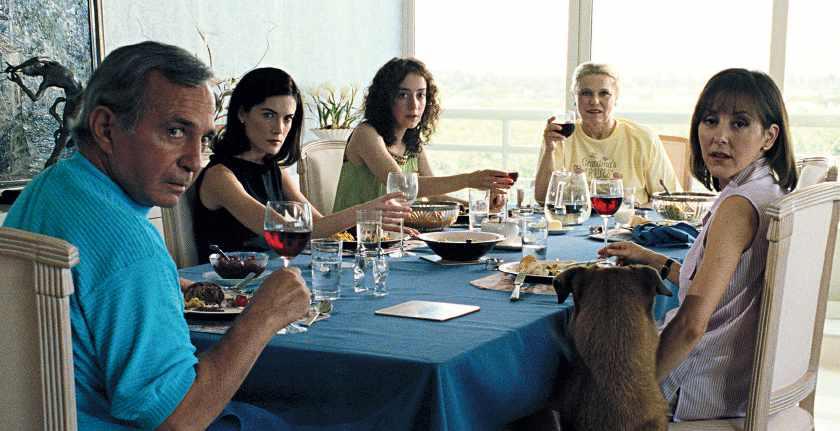
goes on, it becomes clear Solondz has opened the encounter after most writers would have ended the scene. The relationship has just finished and there is an almost rubbernecking quality to the viewer’s experience, a sense that we should not be watching this. More troubling still, the casting of Lovitz is no mistake – and this is funny. When he asks her if there’s someone else, the lacerating reply is: “No. It’s just you.” Alan Bennett’s assessment of Peter Cook could just as easily apply to Solondz: “In him morality is discovered far from its o cial haunts.”
The next scene involves Philip Seymour Ho man’s Allen telling his psychiatrist that he fears he might be boring while the latter zones out and, in voiceover, recounts his shopping list. It transpires Allen spends his spare time making obscene phone calls to women while the psychiatrist, living an outwardly idyllic suburban life, is a paedophile who daydreams about being an active shooter in a quiet park. And so it goes on.


Throughout its nearly two and a half hours we encounter a Dickensian array of grotesques seeking happiness in ways that are beyond merely transgressive. The film provokes laughter and discomfort in equal measure and forces us to confront the kind of pariahs we’d sooner not think about. Unlike a Jimmy Carr joke seemingly intended simply to shock, one gets the feeling that Solondz really means it. As the Chasidic aphorism would have it: “The lowest of the low you can think of is dearer to me than your only son is to you.” Solondz, inevitably, is a Jew. There are shades of Robert Altman in these interconnected tales of broken individuals and the cast is a murderer’s row of character actors of the day. As well as Ho man, Lovitz and Adams, there are inspired turns from Jared Harris, Ben Gazzara, Louise Lasser, Molly Shannon and a whole host of others. The film is anchored, though, by the performance of Dylan Baker as the psychiatrist with the darkest urges of them all. The role was turned down by just about every major actor in Hollywood before Baker came in to read but, with hindsight, it could never have been anybody else. The picture was referred to only as “Untitled Todd Solondz film” during filming and it wasn’t until Baker saw a poster at the Toronto film festival that he learned the actual title. The actor was


staggered but what else or since in American
staggered but what else could one call perhaps the blackest comedy in Hollywood history?
Happiness is one of the great films of the 1990s and it is hard to think of anything quite like it before or since in American cinema. It is Solondz’s most ambitious work and it is telling that his movies since have largely been neglected by critics and audiences alike. Indeed, he struggles so much to raise the funds that his last film was Wiener-Dog, released back in 2016.
work and it is telling that
The director is a television comedy obsessive and uses the tropes of sitcoms to lure the audience into a false sense of security using the mise en scene and interstitial music to devastating e ect. Indeed, few films have funnier sound cues. Solondz has been very open about the fact that he feels he has to love his characters during the writing process and expects his actors to withhold judgement on their actions. He instinctively understands something that has occasionally been obscured since the film’s release at the end of the last century – depicting a thing is not the same as endorsing it. The director’s magnum opus is complicated, provocative and divisive but then so are human beings. Not everyone will be able to stomach it but the rest of us should just be grateful Happiness exists. • Happiness is available now on Criterion Collection 4K UHD

Francis Beckett says his new play set in the 1930s shines a light on current politics

When Rose Cohen, a Jewish woman in London, joined the Communist Party of Great Britain soon after the First World War, it was a decision taken in hope and optimism and idealism. And it killed her.
Rose was not alone with her ideals. In the 1920s and ‘30s, many British Jews joined the party as a bulwark against fascism and antisemitism – only to find that the Soviet Union carried the virus they wanted to exterminate.
Rose Cohen was born in 1894 to Jewish immigrants from Łódź, Poland, and as a teenager was an active member of the East London Federation of Su ragettes.
In the Communist Party of Great Britain (CPGB) she met and fell in love with Lenin’s representative in London, a Ukrainian Jew called Max Petrovsky, living illegally in Britain under the name of Bennett. When Petrovsky was caught and expelled from Britain, Rose went to Moscow with him. They married and had a son, Alyosha.
The knock at the door which Muscovites secretly dreaded came in 1937. Alyosha, now alone, was brought up in a tough Russian orphanage where he was not allowed to mention the names of his parents, for they were “enemies of the people”.
Their story highlights something we have learned about Russia. People thought – Rose and Max thought – that the dark days of the Tsars ended in 1917, and a
new, kinder, fairer society would emerge from the wreckage. That dream was shattered for them and for millions of Soviet citizens by Josef Stalin’s terror.
It might strike you, if you come to see my play Vodka with Stalin in Highgate this month, how similar my Stalin is to a more modern dictator, Vladimir Putin.
In 1991 we again thought that Russia was about to become a better, fairer place. Margaret Thatcher and Ronald Reagan had ‘won’ the cold war, communism was dead, the old Stalinist dictators had been overthrown, Boris Yeltsin was in charge and McDonald’s had a branch in Moscow.
We now know that the new dawn of 1991 was as much of an illusion as the new dawn of 1917; that there is a direct line of descent through Ivan the Terrible, Peter the Great and Stalin through to Putin. As it was with Stalin, it will be some years before we know the full horror that Putin has inflicted on his people.
One of the reasons Max and Rose came under suspicion was because, as Jews, they were considered likely to have sympathised with the Jewish Leo Trotsky. Stalin’s antisemitism grew alongside his paranoia, peaking perhaps in 1953 with the Jewish doctors’ plot – an alleged conspiracy of prominent Soviet Jewish medical specialists to murder leading government and party o cials, a conspiracy that existed only in Stalin’s paranoid imagination.
Right up to 1953, many British Jews thought of the CPGB as a
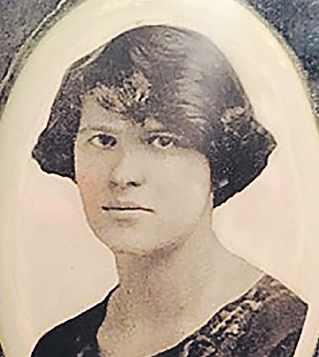
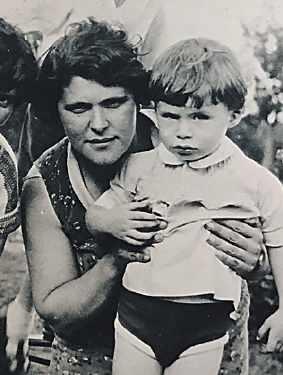

bulwark against fascism. The CPGB even had a section of Jewish business people, who did not particularly share its political and economic aims, but funded it generously nevertheless because communists fought fascists. They were organised into their own CPGB branch, called the commercial branch.
Even after 1953, some of them hung on to their illusions about the Soviet Union. In Arnold Wesker’s play I’m Talking About Jerusalem, the East End Jewish matriarch defends her continued members of the CPGB: “You want me to move to Hendon and forget who I am?”
What does all this tell us? First, people cling to their illusions.
When they were arrested, Rose’s old friend, Harry Pollitt, who had


asked her to marry him (on his own account) no less than 14 times, had become leader of the CPGB and an intimate of Stalin’s. What did he say to Stalin about Rose? How did he carry on leading the CPGB, as he did, right up to 1956, knowing what he knew? We know that Pollitt met Stalin while Rose was in prison, but we don’t know what passed between them. My best guess is in a key scene of my play.
Second, it tells us that Russia is as unpredictable as ever it was, and whenever we think we have it taped, we had best wait awhile and see. Russia remains, as Winston Churchill called it, “a riddle, wrapped in a mystery, inside an enigma”.
Third, when we hear that this
or that political organisation is the only one that will rid the nation of racism and antisemitism, perhaps we should approach the claim with scepticism. In the 1930s, the CPGB, prominent in the organisation of opposition in the streets to Oswald Mosley’s fascists, was making this claim.
Now, the claim seems to be being made by the far right.
Robert Jenrick, contender for the Conservative Party leadership, has cast himself as the defender of Israel, theatrically demanding that a Star of David be placed at all entry points to Britain. Is this a symbol that you can rely on such a politician to fight antisemitism, or is it empty virtue-signalling?
The action of Vodka with Stalin begins in 1917 and ends in 1956, but I will make the bold claim that it has something important to tell us about the world we inhabit in 2024.
• Vodka with Stalin is at Upstairs at the Gatehouse, Highgate, 16-27 October. upstairsatthegatehouse.com


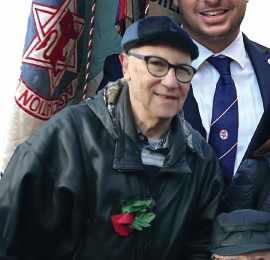














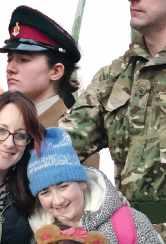





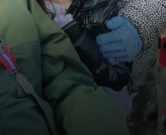
















































SUNDAY 17TH NOVEMBER | PARADE BEGINS 2PM | THE CENOTAPH, LONDON SW1





REGISTER NOW AND SAVE THE DATE TO JOIN AJEX AT THE CENOTAPH AS WE REMEMBER.
In the wake of the October 7th anniversary, we reflect on the ongoing fight against antisemitism. Together, we will honour the thousands of Jewish servicemen and women who fought for our freedom, ensuring their legacy continues to inspire us today.
United as British Jews in pride and purpose, we march not only to Remember, but to actively stand against hatred and discrimination. Veterans, individuals, families and community groups of all ages are welcome to stand tall with us in solidarity. Together, we honour the past and pledge to shape a future free from antisemitism.
If you are a Parade regular or newcomer, be sure to register to participate. To secure your spot to march book your ticket by Friday 8th November at www.ajex.org.uk
To support the Parade as a spectator from the East Whitehall Pavement no booking required. Please allow enough time to arrive at the event as there will be a high level of security provided by CST and the Police.







By Candice Krieger candicekrieger@googlemail.com


The online marketplace is being transformed by tech that understands consumers’ preferences and makes personalised recommendations
commerce is on the cusp of a revolutionary transformation, says Max Sinclair, a former Amazon executive and AI specialist. Sinclair is the co-founder of Ecomtent, which leverages artificial intelligence to help ecommerce retailers optimise their image-based and written product-listing content for AI-powered search.
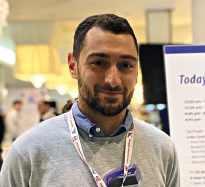
across both written and visual assets.”
Ecomtent’s technology generates product descriptions, blog posts and other types of content quickly and e ciently and improves how products are presented, making them more appealing to potential buyers.
Sinclair, 29, believes it will not be long before we have AI ‘agents’ handling our shopping for us. He predicts these intelligent LLMs (large language models), machinelearning models that can comprehend and generate human language text, will be able to understand consumer preferences, make personalised recommendations and even complete purchases autonomously, e ectively serving as personal shoppers.
and retailers and saw the potential of AI in e-commerce after witnessing the capabilities of Stable Diffusion, an AI model that can generate high-quality images from text descriptions.”
He says: “Generative AI will completely transform how consumers shop online, with conversational-style search poised to become the new normal. The current best Search Engine Optimisation [making products easier to find online] practices will look completely outdated in just 12 months. Longtail keyword matching is dead, and the future will be matching customer intent
Founded in 2022, Ecomtent recently raised $850,000 in pre-seed funding, led by MaRS Investment. Last year, Ecomtent took part in Techstars Future of Ecommerce powered by eBay and the funding round included Techstars and eBay Ventures. The company has already made big strides in the market, completing successful pilots with major retailers, including two with annual revenues of $11bn and $14bn, positioning Ecomtent as the go-to solution in the Amazon seller and agency communities.
“In a couple of years, we will have AI agents doing the shopping for us. If you think about boring purchases, like washing machine parts where you have to search for and scroll through endless options, this transformation of AI agents will streamline the shopping process, eliminating the need for customers to sift manually through countless product listings.”
He continues: “We will have an AI agent, and we will say: ‘Hi Alexa, or whoever, buy me a xxx.’ We will move towards trusting AI, just as we do people, and trust it to search the web and find the best prices as it learns to understand our needs.”
Earlier this year, Amazon launched Rufus, an AI-powered shopping assistant trained on Amazon’s product catalogue and information from across the web.
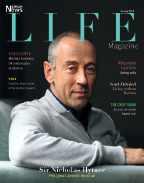




In 2022, he teamed with Timur Luguev, who has a PhD in AI. Recognising the transformative power of this technology, they developed a minimum viable product (MVP) over a single weekend, and the rest was history. As for the future, Sinclair says that what we know now will look unrecognisable “the same way that we look at prehistoric humans as unrecognisable”.
He adds: “We are looking at a LLM searchbased future and our role is to help sellers and retailers prepare for it.”
ecomtent.ai


Rufus can answer customer questions on shopping needs, products and comparisons, make recommendations based on this, and facilitate product discovery in the same Amazon shopping experience that customers use regularly. Users can ask Rufus a variety of questions, from general product research such as: “What should I consider when buying a TV?” to more specific inquiries including product comparisons and recommendations.
Rufus has been launched for most UK customers.






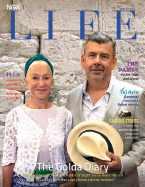


A former Amazon executive, Sinclair spent six years at the online seller. He held various leadership positions that shaped his understanding of the e-commerce landscape. He led the launch of Amazon Business (B2B) in the UK, oversaw customer browsing and catalogue quality for Amazon’s launch in Singapore and played a key role in scaling-up Amazon’s grocery business across the EU.
“I learnt about the intricacies of online retail and the challenges faced by sellers

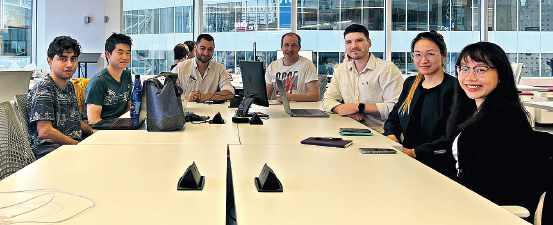












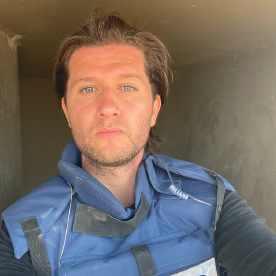




In our thought-provoking series, rabbis, rebbetzins and educators relate the week’s parsha to the way we live today
BY LAURIE MAURER UNITED SYNAGOGUE EDUCATION
Happiness and mourning, at the same time
Rabbi Doron Perez had two sons, both IDF o cers. Daniel was thought to have been kidnapped on 7 October. 163 days later it was confirmed that he had been killed defending Kibbutz Nahal Oz, with his body abducted to Gaza, where it remains. His brother, Yonatan, was shot in the leg on 7 October, yards from where Daniel had been shot. On 17 October Yonatan got married, not yet knowing his brother’s fate. Rabbi Perez has become known for his sons’ stories, his unwavering faith and inspiring words.
He wrote a booklet for the High Holy days in which he says he has now understood the words of Kohelet, that are read in shul this Shabbat:
“King Solomon, the wisest of men, highlights in chapter three that for every time, and every hour beneath the sun, there are di erent experiences: a time of life and a time of death, a time to plant and a time to uproot, a time of peace and a time of war, a time to mourn and a time to celebrate. I had always previously understood that Solomon was talking about di erent times in our lives. Life can be divided into good times and bad times: sometimes it’s a time for happiness and growth; sometimes for mourning and destruction.
“I understood for the first time that this is not necessarily the case. Perhaps Solomon, in his wisdom,
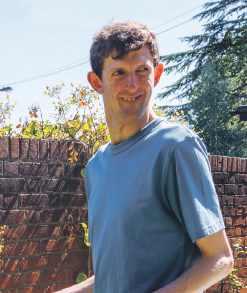
was teaching us that sometimes all of these things happen together.”
We can all think of examples in our personal lives where we hold conflicting emotions simultaneously. I am writing this shortly after the United Synagogue’s 7 October memorial events, where we hosted Barak Deri, Oriya Mevorach and Yadin Gellman, who shared accounts of their experiences that day. They all had a common thread.
The stories told on that day are not mourning what happened to them. In fact, not one person was thinking about themselves in their moment of terror. They thought of their loved ones, family and friends. Barak said that his permanent injuries are in fact the best thing that happened to him, as he appreciates life so much more now.
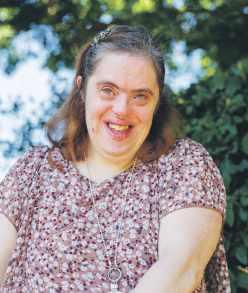
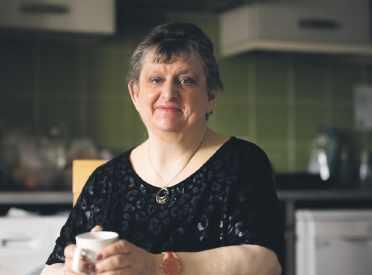

The Jewish people are tasked on Sukkot to build a sukkah and dwell in it for seven days, with this time being known as z’man simchateinu, the time of our happiness. Bringing all the wisdom of the people I have mentioned above, we can see that real happiness is not having it all. This is not possible, nor does it guarantee happiness.
Rabbi Sacks z”l put it stunningly: “Kohelet finds life short. The prospect of death threatens to rob him of all happiness, until he realises that mortality is the very condi-
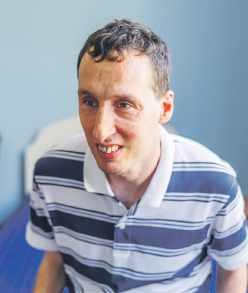

tion of our happiness. Because life is short, every moment is precious. That is the knowledge most of us are only taught through pain or crisis or loss. Work, love, life itself: these are the sources of joy. The rest is gift-wrapping. Happiness lies in being, not in having.”
When we gather in our sukkahs this year, let’s feel our pain at the continuation of the plight of the hostages and continued conflict, as well as the joy of each precious moment we have with the gifts God has given us.
#NorwoodRH24
And we need your support this Rosh Hashanah to continue living life our way.
Please donate today. The need has never been greater.
norwood.org.uk/rh24


BY RABBI PROF DEBORAH KAHN-HARRIS PRINCIPAL, LEO BAECK COLLEGE
As an avid swimmer in Kenwood Ladies’ Pond, I know that the season has turned. Water temperatures that a mere fortnight ago were a relatively comfortable 16.5C are now down to 12C, and steadily dropping.
And as a Jew, I am acutely aware that a fortnight ago was Rosh Hashanah during, as it so often is, the last warm days of the dying summer. Sukkot, by contrast, is forecast to be wet and cool – a hard time to motivate oneself either to swim or, as we traditionally do on Sukkot, dine outdoors.
This changeable time of year is reflected in the precariousness of Sukkot’s origins. We recall the journeys of the Israelites in the desert through recreating their very temporary dwelling, the Sukkah, and then eating
and even perhaps residing in one ourselves. Sukkot is a festival where we are reminded at every turn that the world is unpredictable, sometimes beautiful and bountiful, yet also too often brutal. And as the autumn harvest festival, we are reminded that agriculturally based societies live or die on the strength of their autumn harvest.
The book of Kohelet, which we read on Sukkot, only serves to heighten this sense of uncertainty. “Havel havalim amar Kohelet havel havalim hakkol havel” [Kohelet 3:1].
Translated famously by the King James Bible as “Vanity of vanities, saith the preacher, vanity of vanities; all is vanity”, the words in contemporary English mean something much more like ‘absurdity’ (as in the technical terminology of the Existentialists) or ‘ephemerality’. All is fleeting, like vapours rising from water on an autumn morning, disappearing before a swimmer’s eyes.
Again, in the poem that begins chapter three, Kohelet says that there is a time for everything. He counterpoints birth and death,
for your unwanted gold today! Call Jonathan 020 8446 8538
laughter and tears, seeking and loosing, and much else, but the sentiment portrayed is not as comforting as we may view it at first glance. The cycle that Kohelet describes is endless. We humans cannot stop any of these things from happening.
A stimulating series where our progressive rabbis consider how Biblical figures might act when faced with 21st-century issues

Life will turn to death as surely as summer turns to autumn. So, too, with war and peace. Indeed, Kohelet’s concern is not, as Pete Seeger would have had us believe, that there is “time for peace, I swear it’s not too late”, but rather as Kohelet asks us in the end: “What value, then, can those who labour get from what they earn?” [Kohelet 3:9]. What value, indeed? If the world is ephemeral, what can we hold on to?
For many of us, we are living through most unstable period we have ever known. That we are rapidly cycling through life and death, weeping and laughing, wailing and dancing,





silence and speaking is now blindingly evident. A sukkah provides little protection from the ravages of either the elements or world events. Yet Sukkot asks us to hold on to these temporary structures, like wisps of meaning that we build to protect ourselves, “before… the clouds come back again after the rain” [Kohelet 12:2].



A Proud Past, A Bright Future

Calling all Prospective Nursery & Reception families
Calling all Prospective Nursery & Reception families
Tuesday 24th September
Tuesday 24th September
Wednesday 30th October,
Wednesday 30th October,
Thursday 14th November we will be holding open mornings at 10am
Thursday 14th November we will be holding open mornings at 10am
You will have personal tours of our wonderful school, get to meet our Head Teacher and see the school in action. Some spaces are available across the school.
You will have personal tours of our wonderful school, get to meet our Head Teacher and see the school in action. Some spaces are available across the school.
To attend, please email admin@hasmonean-pri.barnet.sch.uk or phone the Office on 020 82027704
To attend, please email admin@hasmonean-pri.barnet.sch.uk or phone the Office on 020 82027704
“How
Westminster Synagogue Symposium
Thursday 31st October
Join us for the next instalment of our Westminster Synagogue Symposium Series, where we invite speakers from both within and outside our community to explore a variety of topics.


Professor Michael Cox — Moderator Professor of International Relations at LSE; founding director of LSE IDEAS; author of influential works on post-Cold War politics and international affairs.
Professor Larry Kramer — Panellist President and Vice Chancellor of LSE; 15th Dean of Stanford Law School; former President of the William and Flora Hewlett Foundation and a member of the American Philosophical Society.
Thursday 31st October 7:00pm Discussion 7:45pm Refreshments 8:15pm Q&As


National security and political
lecturer on the
US politics, world geopolitics and long-term Global Trends; frequent commentator on Sky News, BBC and Al Arabiya.
Tickets £15 non-members, £10 WS members Book westminstersynagogue.org
Questions events@westminstersynagogue.org













TREVOR GEE
Qualifications:
• Managing director, consultant specialists in affordable family health insurance
• Advising on maximising cover, lower premiums, pre-existing conditions
• Excellent knowledge of health insurers, cover levels and hospital lists
• LLB solicitors finals
• Member of Chartered Insurance Institute
PATIENT HEALTH
020 3146 3444/5/6
www.patienthealth.co.uk trevor.gee@patienthealth.co.uk

DONNA OBSTFELD
Qualifications:
• FCIPD Chartered HR Professional
• 25 years in HR and business management.
• Mediator, business coach, trainer, author and speaker
• Supporting businesses and charities with the hiring, managing, inspiring and firing of their staff
DOHR LTD
020 8088 8958
www.dohr.co.uk
donna@dohr.co.uk

ADAM SHELLEY
Qualifications:
• FCCA chartered certified accountant
• Accounting, taxation and business advisory services
• Entrepreneurial business specialist including start-up businesses
• Specialises in social media influencers and sport sector including tax planning and financial management
• Maurice Wohl Charitable Foundation Volunteer of the Year JVN award
SOBELL RHODES LLP 020 8429 8800 www.sobellrhodes.co.uk a.shelley@sobellrhodes.co.uk

LISA WIMBORNE
Qualifications:
Able to draw on the charity’s 50 years of experience in enabling people with physical disabilities or impaired vision to live independently, including:
• The provision of specialist accommodation with 24/7 on-site support
• Knowledge of the innovations that empower people and the benefits available
• Understanding of the impact of a disability diagnosis
JEWISH BLIND & DISABLED 020 8371 6611
www.jbd.org
Lisa@jbd.org

ILAN RUBINSTEIN
Qualifications:
• UK born, licenced Israel estate agent in Israel since 2001
• Ilan assists in buying, financing & re-sale of new & existing property in Israel.
• Helps level the playing field opposite vendors, developers & even the bank
• Attentive to your needs, saving you time, hassle & money

I.L.A.N. ESTATES & INVESTMENTS “Bringing Jews Home” UK: 0203-807-0878 ISRAEL: +972-504-910-604 www.ilanrealestate.com nadlan@hotmail.com

JONATHAN WILLIAMS
Qualifications:
• Jewellery manufacturer since 1980s
• Expert in the manufacture and supply of diamond jewellery, wedding rings and general jewellery
• Specialist in supply of diamonds to the public at trade prices
JEWELLERY CAVE LTD 020 8446 8538 www.jewellerycave.co.uk jonathan@jewellerycave.co.uk

CAROLYN ADDLEMAN
Qualifications:
• Lawyer with over 20 years’ experience in will drafting and trust and estate administration. Last 14 years at KKL Executor and Trustee Company
• In close contact with clients to ensure all legal and pastoral needs are cared for
• Member of the Society of Trust and Estate Practitioners
KKL EXECUTOR AND TRUSTEE COMPANY 020 8732 6101 www.kkl.org.uk enquiries@kkl.org.uk


STEPHEN MORRIS
Qualifications:
• Managing director of Stephen Morris Shipping Ltd
• 45 years’ experience in shipping household and personal effects
• Chosen mover for four royal families and three UK prime ministers
• Offering proven quality specialist advice for moving anyone across the world or round the corner
STEPHEN MORRIS SHIPPING LTD 020 8832 2222 www.shipsms.co.uk stephen@shipsms.co.uk
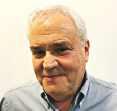
JACOB BERNSTEIN
Qualifications:
• A member of the APCC, specialising in financial services compliance for:
• Mortgage, protection and general insurance intermediaries;
• Lenders, credit brokers, debt counsellors and debt managers;
• Alternative Investment Fund managers;
• E-Money, payment services, PISP, AISP and grant-making charities.
RICHDALE CONSULTANTS LTD 020 7781 8019
www.richdale.co.uk jacob@richdale.co.uk

DR BEN LEVY
Qualifications:
• Doctor of psychology with 15 years’ experience in education and corporate sectors
• Uses robust, evidence-based methods to help you achieve your goals, whatever they may be
• Works with clients individually to maximise success
MAKE IT HAPPEN 07779 619 597 www.makeit-happen.co.uk ben@makeit-happen.co.uk

SUE CIPIN OBE
Qualifications:
• 24 years+ hands-on experience, leading JDA in significant growth and development.
• Understanding of the impact of deafness on people, including children, at all stages
• Extensive services for people affected by hearing loss/tinnitus
• Technology room with expert advice on and facilities to try out the latest equipment.
• Hearing aid advice, support and maintenance
JEWISH DEAF ASSOCIATION 020 8446 0502 www.jdeaf.org.uk mail@jdeaf.org.uk


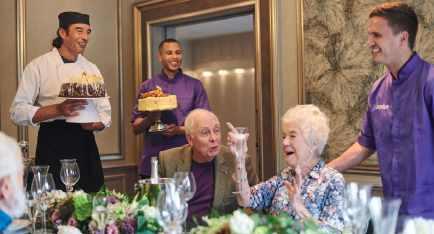

If you’re looking for the highest quality residential and specialist care in the most luxurious surroundings, you’ll nd it at Signature.
Our award-winning team includes registered nurses on site 24 hours a day, providing care responsive to individual preferences and needs. Studios or apartments perfect for couples, together with a wealth of luxurious lifestyle amenities, dining options and outside space, ensure that our residents retain their independence in style.
Come and meet the team for yourself and get a sense of what life is like at Signature.






Wanted all Antiques & furniture including Lounge Dining and Bedroom Suites. Chests of drawers. Display and Cocktail Cabinets. Furniture by Hille. Epstein. Archie shine. G plan etc in Walnut. Mahogany. Teak and Rosewood.
We also buy Diamonds & Jewellery. Gold. Silverware. Paintings. Glass. Porcelain. Bronzes etc.
All Antiques considered. Full house clearances organised. Very high prices paid, free home visits.
Check our website for more details www.antiquesbuyers.co.uk
Email: info@antiquesbuyers.co.uk
Please call Sue Davis on Freephone: 08008402035 WhatsApp Mobile: 07956268290
Portobello Rd London. By appointments only. Please note rather than acting as agents for other organisations and charging you commission. Please be assured that in dealing with Antiques Buyers we deal directly with our clients and pay in full at the time of the transaction.
Antique – Reproduction – Retro Furniture (any condition)
Epstein, Archie Shine, Hille, G Plan, etc.
Dining Suites, Lounges Suites, Bookcases, Desks, Cabinets, Mirrors, Lights, etc. House clearances
Single items to complete homes
MARYLEBONE ANTIQUES - 8 CHURCH STREET NW8 8ED 07866 614 744 (ANYTIME) 0207 723 7415 (SHOP)
- e-mail -
@maryleboneantiques.co.uk

CLOTHING WANTED

Friendly Family Company established for 30 years
We clear houses, flats, sheds, garages etc. No job too big or too small! Rubbish cleared as part of a
Furs, Jewellery, Old Costume Jewellery, Watches, Silver, Designer Bags, anything vintage. 01277 352560
YOU CONTACT US BEFORE SELLING


Confidential Bereavement Counselling for adults and children individually. Support Groups available. We offer in person, online and telephone counselling. Contact Jewish Bereavement Counselling Service in confidence. 0208 951 3881 enquiries@jbcs.org.uk | www.jbcs.org.uk CHARITY & WELFARE
Former “Magic Circle” solicitor offers help with:
• CVs and personal statements
• interviews and assessment days
• coping with stress and workload
• promotion and new opportunities
For more information contact Tom lawmentor@btinternet.com / 07590 057097
Sheltered Accommodation
We have an open waiting list in our friendly and comfortable warden assisted sheltered housing schemes in Ealing, East Finchley and Hendon. We provide 24-hour warden support, seven days a week; a residents’ lounge and kitchen, laundry, a
patio and garden. For further details and application forms, please contact Westlon Housing Association on

LAW MENTOR
Former “Magic Circle” solicitor offers help with:
• CVs and personal statements
• interviews and assessment days
• coping with stress and workload
• promotion and new opportunities
For more information contact Tom lawmentor@btinternet.com / 07590 057097















